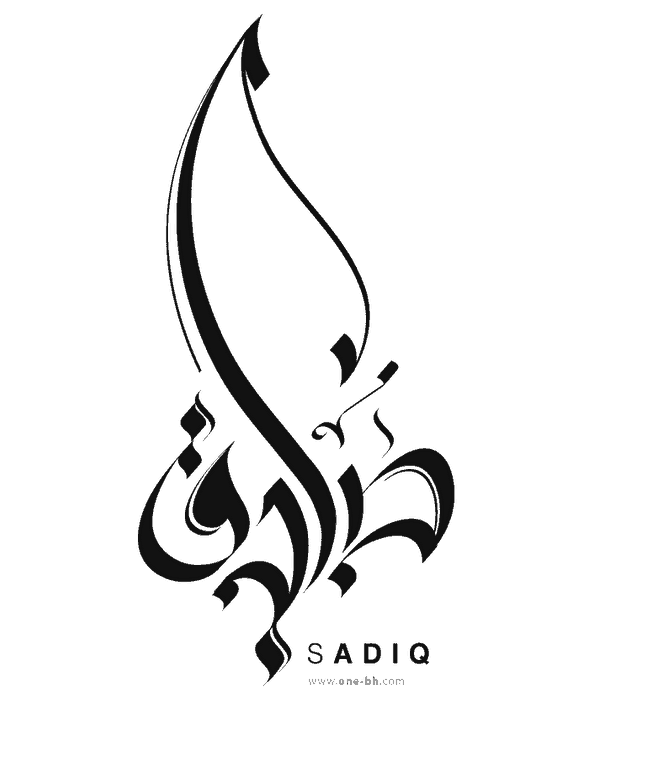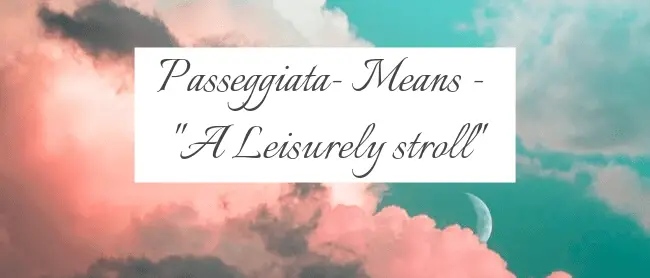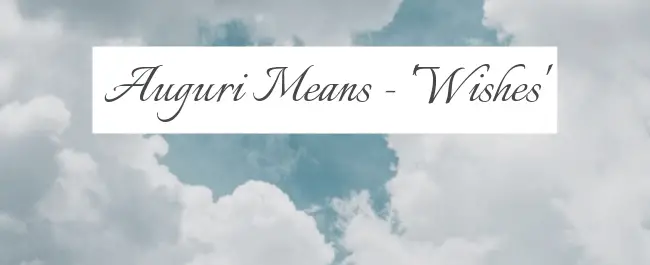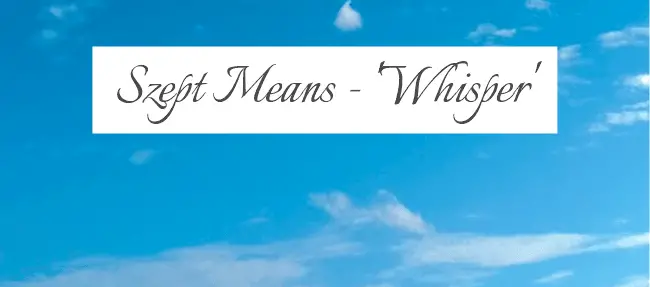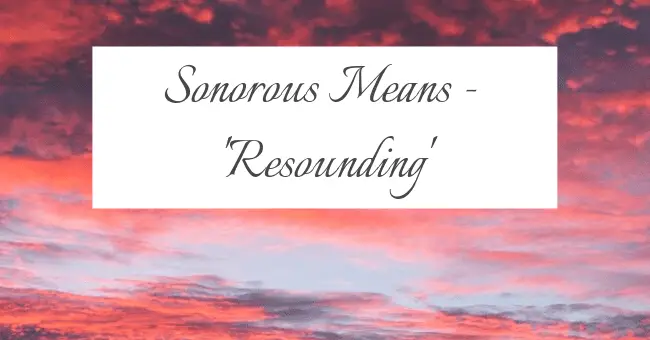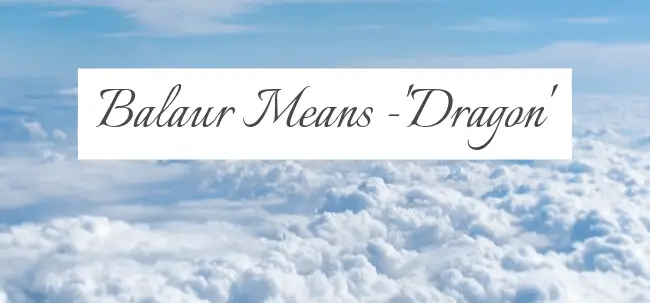What makes a word beautiful?
Is it the sound of the word or its meaning?
The study of the pleasantness or unpleasantness of the way words and phrases sound (regardless of their meaning) is called phonaesthetics.
But I think the combination of sound and meaning is what makes for pretty words.
Consider the word “diarrhea” which trills off the tongue but isn’t a pleasant topic to ponder.
But the word “diary” is equally pleasing to the ear and has an intriguing meaning.
What Are the Most Beautiful Words?
The most beautiful words in English are those that thrill the ear and that stir the mind or soul.
They are words that inspire, uplift, excite, comfort, challenge, move and entice us. But they can also have a neutral or even unpleasant meaning (hemorrhage, flatulence, etc.).
British linguist, David Crystal, created a series of attributes of words that are commonly considered beautiful. Those attributes include:
- Having three or more syllables.
- Emphasis on the first syllable.
- The presence of particular letters people enjoy saying (like I and M).
Ultimately, the most beautiful words are the words that you find beautiful.
What is the Prettiest Word in the World?
There are more than 7000 languages in the world, with hundreds of thousands of words in most of them. So it’s difficult (if not impossible) to narrow the list to one word alone.
You might start by exploring the most beautiful languages in the world which are often considered Italian, French, Arabic, and Turkish.
But still, what each person finds beautiful is subjective.
Maybe we should just be happy there are so many lovely words in all languages.
How to Use Beautiful Words in English
Whether you are a logophile (a word lover) and simply enjoy the variety and character of words, or you’re a writer who is looking for the perfect word, you’ll find yourself needing to find aesthetic words at some point.
Maybe you wonder, “What are elegant words I can use to reflect my intelligence or sophisticated style.” The words you use do communicate to others who you are and how you see yourself.
You can use these words to . . .
- Expand your vocabulary.
- Write a memorable poem or song lyrics related to something lovely and pleasing.
- Better express yourself in conversation.
- Create a mood or feeling with your writing.
- Enhance your descriptions of people, places, emotions, and things.
- Develop a particular rhythm or flow with your writing.
- Develop your own list of favorite words with beautiful meanings and sounds.
Are you ready to explore some really good words that you can add to your vocabulary?
Our list of beautiful words below is a great resource to bookmark and keep handy whenever you need just the right word that sounds lovely.
Don’t have time to read the complete list of beautiful words? You can download the PDF here.
1. Abundance
A very large quantity of something.
Again and again in the same way; forever
3. Admirable
Arousing or deserving respect and approval.
4. Adoration
Deep love and respect.
5. Affable
Friendly, good-natured, or easy to talk to.
6. Agility
Ability to move or think quickly and easily.
7. Ailurophile
A cat lover.
8. Alacrity
Brisk and cheerful readiness.

9. Alluring
Powerfully and mysteriously attractive or fascinating; seductive.

10. Aloha
A Hawaiian word used when greeting or parting from someone.
11. Altruism
The belief in or practice of disinterested and selfless concern for the well-being of others.
12. Amaranthine
From the Greek word amarantos, meaning immortal or unfading.
13. Amiable
Having or displaying a friendly and pleasant manner.
14. Amorous
Showing, feeling, or relating to sexual desire.
15. Angelic
An exceptionally beautiful, innocent, or kind person.
16. Apotheosis
The highest point in the development of something; culmination or climax.
17. Assemblage
A collection or gathering of things or people.
18. Astonishing
Extremely surprising or impressive; amazing.
19. Astounding
Surprisingly impressive or notable.
20. Ascension
The act of rising to an important position or a higher level.
21. Astral
Of, connected with or resembling the stars.
22. Audacious
Showing a willingness to take surprisingly bold risks.
23. Aurora
A natural electrical phenomenon characterized by the appearance of streamers of reddish or greenish light in the sky, usually near the northern or southern magnetic pole.
24. Awe
A feeling of reverential respect mixed with fear or wonder.
25. Beatify
To make holy or sacred.
26. Beauteous
Beautiful.
27. Becoming
Flattering a person’s appearance.
28. Beguile
To charm or enchant (someone), sometimes in a deceptive way.

29. Belonging
An affinity for a place or situation.
30. Beloved
Dearly loved.
31. Benefactor
A person who gives money or other help to a person or cause.
32. Benevolence
The quality of being well-meaning; kindness.
33. Blazing
To burn fiercely or brightly.
34. Blessing
A beneficial thing for which one is grateful; something that brings well-being.
35. Bliss
Perfect happiness; great joy.
36. Blossom
The state or period of flowering.
37. Breathtaking
Astonishing or awe-inspiring in quality, so as to take one’s breath away.
38. Breeziness
Fresh and animated;lively.
39. Brilliance
An intense brightness of light.
40. Brisk
Active, fast, and energetic.
41. Bubbling
Characterized by cheerful high spirits.
42. Bucolic
Relating to the pleasant aspects of the countryside and country life.
43. Bungalow
A low house, with a broad front porch, having either no upper floor or upper rooms set in the roof, typically with dormer windows.
44. Buoyancy
The ability or tendency to float in water or air or some other fluid.
45. Calcination
To heat (a substance) to a high temperature but below the melting or fusing point, causing loss of moisture, reduction or oxidation, and the decomposition of carbonates and other compounds.
46. Calm
Not showing or feeling nervousness, anger, or other strong emotions.
47. Candor
The quality of being open and honest in expression; frankness.
48. Caprice
A sudden and unaccountable change of mood or behavior.
49. Carpe Diem
Latin, ‘seize the day!’, a quotation from Horace.
50. Cascade
A small waterfall, typically one of several that fall in stages down a steep rocky slope.
51. Cashmere
Fine, soft wool, originally that from the Kashmir goat.

52. Catharsis
The process of releasing, and thereby providing relief from, strong or repressed emotions.
53. Celerity
The swiftness of movement.
54. Centered
Well balanced and confident or serene.
55. Champion
A person who fights or argues for a cause or on behalf of someone else.
56. Charisma
Compelling attractiveness or charm that can inspire devotion in others.
57. Charm
The power or quality of giving delight or arousing admiration.
58. Chatoyant
Of a gem, especially when cut en cabochon, showing a band of bright reflected light caused by aligned inclusions in the stone.
59. Cheerful
Noticeably happy and optimistic.
60. Chrysalis
A transitional state.
61. Cinnamon
An aromatic spice made from the peeled, dried and rolled bark of a Southeast Asian tree.
62. Clarity
The quality of being coherent and intelligible.
63. Classy
Stylish and sophisticated.
64. Clearheaded
Alert and thinking logically and coherently.
65. Clinomania
An obsession with bed rest.
66. Coalesce
Come together to form one mass or whole.
67. Comely
Typically a woman who is pleasant to look at; attractive.
68. Compassion
Sympathetic pity and concern for the sufferings or misfortunes of others.
69. Conflate
Combine (two or more texts, ideas, etc.) into one.

70. Consciousness
The state of being awake and aware of one’s surroundings.
71. Contentment
A state of happiness and satisfaction.
72. Coruscate
Flash or sparkle of light.
73. Creativity
The use of the imagination or original ideas, especially in the production of an artistic work.
74. Crepuscular
Of, resembling, or relating to twilight.
75. Crystalline
Having the structure and form of a crystal; composed of crystals.
76. Cuddle
Hold close in one’s arms as a way of showing love or affection.
77. Cynosure
A person or thing that is the center of attention or admiration.
78. Dalliance
A casual romantic or sexual relationship.
79. Dandy
A man unduly devoted to style, neatness, and fashion in dress and appearance.
80. Dapper
Typically a man who is neat and trim in dress, appearance, or bearing.
81. Dauntless
Showing fearlessness and determination.
82. Dazzling
Extremely bright, especially so as to blind the eyes temporarily.
83. Debonair
A man who is confident, stylish, and charming.
84. Delicate
Very fine in texture or structure; of intricate workmanship or quality.
85. Delicious
Highly pleasant to the taste.
86. Delightful
Causing delight; charming.
87. Demesne
Land attached to a manor and retained for the owner’s own use.
88. Demure
A woman who is reserved, modest, and shy.
89. Denouement
The final part of a play, movie, or narrative in which the strands of the plot are drawn together and matters are explained or resolved.
90. Desirable
Wanted or wished for as being an attractive, useful, or necessary course of action.
91. Desuetude
A state of disuse.
92. Desultory
Lacking a plan, purpose, or enthusiasm.
93. Devotion
Love, loyalty, or enthusiasm for a person, activity, or cause.
94. Diaphanous
Light, delicate, and translucent, especially a fabric.
95. Discombobulate
To disconcert or confuse someone.
96. Dissemble
To conceal one’s true motives, feelings, or beliefs.
97. Divinity
The state or quality of being divine.
98. Doting
Extremely and uncritically fond of someone; adoring.
99. Dreamy
Having a magical or pleasantly unreal quality; dreamlike.
100. Dulcet
A sweet and soothing sound.
101. Earnest
Resulting from or showing sincere and intense conviction

102. Ebullience
The quality of being cheerful and full of energy; exuberance.
103. Ecstasy
An overwhelming feeling of great happiness or joyful excitement.

104. Effervescent
A liquid giving off bubbles; fizzy.
105. Efflorescence
A state or time of flowering.
106. Effortless
Requiring no physical or mental exertion.
107. Elation
Great happiness and exhilaration.
108. Elegant
Pleasingly graceful and stylish in appearance or manner.
109. Elision
The omission of a sound or syllable when speaking
110. Elixir
A magical or medicinal potion.
111. Eloquence
Fluent or persuasive speaking or writing.
112. Embrocation
A liquid used for rubbing on the body to relieve pain from sprains and strains.
113. Emollient
Having the quality of softening or soothing the skin.
114. Emulate
Match or surpass (a person or achievement), typically by imitation.
115. Enamoured
To be filled with a feeling of love for someone or something.
116. Enchanted
Placed under a spell; bewitched.
117. Enraptured
Experiencing intense pleasure or joy.
118. Enthralled
Experiencing fascinated attention.
119. Ephemeral
Lasting for a very short time.
120. Epiphany
A moment of sudden revelation or insight.
121. Equanimity
Mental calmness, composure, and evenness of temper, especially in a difficult situation.
122. Equilibrium
A state in which opposing forces or influences are balanced.
123. Erstwhile
Former.
124. Ethereal
Extremely delicate and light in a way that seems too perfect for this world.

125. Etiquette
The customary code of polite behavior in society or among members of a particular profession or group.
126. Euphoria
A feeling or state of intense excitement and happiness.
127. Evanescent
Soon passing out of sight, memory, or existence; quickly fading or disappearing.
128. Evocative
Bringing strong images, memories, or feelings to mind.
129. Exonerate
To absolve someone from blame for a fault or wrongdoing, especially after due consideration of the case.
130. Exquisite
Extremely beautiful and, typically, delicate.
131. Exuberant
Filled with or characterized by a lively energy and excitement.
132. Fabulous
Amazingly good; wonderful.
133. Faithful
Loyal, constant, and steadfast.
134. Fascination
The power to fascinate someone; the quality of being fascinating.
135. Feasible
Possible to do easily or conveniently.

136. Feisty
A person who is relatively small or weak but also lively, determined, and courageous.
137. Felicity
Intense happiness.
138. Festive
Cheerful and jovially celebratory.
139. Fetching
Attractive.
140. Fidelity
Faithfulness to a person, cause, or belief, demonstrated by continuing loyalty and support.
141. Filament
A slender threadlike object or fiber, especially one found in animal or plant structures.
142. Flawless
Without any blemishes or imperfections; perfect.
143. Flourish
To grow or develop in a healthy or vigorous way, especially as the result of a particularly favorable environment.
144. Flowing
Hanging or draping loosely and gracefully.
145. Forbearance
Patient self-control; restraint and tolerance.
146. Fortitude
Courage in pain or adversity.
147. Friendship
The emotions or conduct of friends; the state of being friends.
148. Fugacious
Tending to disappear; fleeting.
149. Fulfilling
Making someone satisfied or happy because of fully developing their character or abilities.
150. Furtive
Attempting to avoid notice or attention, typically because of guilt or a belief that discovery would lead to trouble; secretive.
151. Gambol
Run or jump about playfully.
152. Gargantuan
Enormous.
153. Giddy
Having a sensation of whirling and a tendency to fall or stagger; dizzy.

154. Ginger
A hot, fragrant spice made from the rhizome of a plant, which may be chopped or powdered for cooking, preserved in syrup, or candied.
155. Glamour
An attractive or exciting quality that makes certain people or things seem appealing.
156. Glorious
Having a striking beauty or splendor that evokes feelings of delighted admiration.
157. Goddess
A woman who is adored, especially for her beauty.
158. Gorgeous
Beautiful; very attractive.
159. Gossamer
Used to refer to something very light, thin, and insubstantial or delicate.
160. Graceful
Having or showing grace or elegance.
161. Halcyon
Denoting a period of time in the past that was idyllically happy and peaceful.
162. Handsome
A good-looking man.
163. Harbinger
A forerunner of something.
164. Harmony
The quality of forming a pleasing and consistent whole.
165. Heartfelt
A feeling or its expression that is sincere; deeply and strongly felt.
166. Heartwarming
Emotionally rewarding or uplifting.
167. Heavenly
Very pleasing; wonderful.
168. Hilarity
Extreme amusement, especially when expressed by laughter.
169. Holiness
The state of being holy.
170. Hopefulness
Having or manifesting hope.
171. Humility
A modest or low view of one’s own importance; humbleness.
172. Idyllic
A time or place that is extremely happy, peaceful, or picturesque.
173. Illumination
Lighting or light.
174. Illustrious
Well known, respected, and admired for past achievements.
175. Imbrication
An overlapping of edges (as of tiles or scales).
176. Imbroglio
An extremely confused, complicated, or embarrassing situation.
177. Imbue
To inspire or permeate with a feeling or quality.
178. Incandescence
The light emmited by an incandescent object.
179. Incipient
In an initial stage; beginning to happen or develop.

180. Ineffable
Too great or extreme to be expressed or described in words.
181. Ingenue
An innocent or unsophisticated young woman, especially in a play or film.
182. Inglenook
A space on either side of a large fireplace.
183. Insouciance
Casual lack of concern; indifference.
184. Intrepid
Fearless; adventurous (often used for rhetorical or humorous effect).
185. Inure
Accustom to something, especially something unpleasant.
186. Invincible
Too powerful to be defeated or overcome.
187. Iridescent
Showing luminous colors that seem to change when seen from different angles.
188. Jaunty
Having or expressing a lively, cheerful, and self-confident manner.
189. Jocular
Fond of or characterized by joking; humorous or playful.
190. Jovial
Cheerful and friendly.

191. Joyous
Feeling,showing,or causing joy; joyful
192. Jubilant
Feeling or expressing great happiness and triumph.
193. Judicious
Having or showing good judgment or sense.
194. Juvenescent
Becoming young or youthful.
195. Kindred
One’s family and relations.
196. Kindliness
The quality of being kind, warmhearted, or gentle; kindness.
197. Kissable
Capable of being kissed; inviting to be kissed through attractiveness.
198. Labyrinthine
A network like a labyrinth; irregular and twisting.
199. Lagniappe
Something given as a bonus or extra gift.
200. Lagoon
A stretch of salt water separated from the sea by a low sandbank or coral reef.
201. Languid
Displaying or having a disinclination for physical exertion or effort; slow and relaxed.
202. Languor
The state or feeling, often pleasant, of tiredness or inertia.
203. Lassitude
A state of physical or mental weariness; lack of energy.
204. Leisure
Free time.
205. Lilting
Speak, sing, or sound with a lilt.
206. Lissome
A person or their body that is thin, supple, and graceful.

207. Lithe
A person’s body that is thin, supple, and graceful.
208. Lovable
Inspiring or deserving love or affection.
209. Lullaby
A quiet, gentle song sung to send a child to sleep.
210. Luminescence
The emission of light by a substance that has not been heated, as in fluorescence and phosphorescence.
211. Luxury
Sumptuous or extremely comfortable living surroundings.
212. Magnificent
Splendid in appearance;grand.
213. Marvelous
Causing great wonder; extraordinary.
214. Mellifluous
Sweet or musical; pleasant to hear.
215. Mellow
Pleasantly smooth or soft; free from harshness.
216. Mindfulness
A mental state achieved by focusing one’s awareness on the present moment, while calmly acknowledging and accepting one’s feelings, thoughts, and bodily sensations, used as a therapeutic technique.
217. Minutiae
Small or trivial details.
218. Moiety
Each of two parts into which a thing is or can be divided.
219. Mondegreen
A misunderstood or misinterpreted word or phrase resulting from a mishearing of the lyrics of a song.
220. Murmurous
Filled with or characterized by murmurs; low and indistinct
221. Nemesis
A long-standing rival; an archenemy.
222. Namaste
A respectful greeting said when giving a namaskar.
223. Nebulous
Unclear, vague, or ill-defined concept or idea.
224. Nirvana
A transcendent state in which there is neither suffering, desire, nor sense of self, and the subject is released from the effects of karma and the cycle of death and rebirth. It represents the final goal of Buddhism.
225. Nourishment
The food or other substances necessary for growth, health, and good condition.
226. Nurture
Care for and encourage the growth or development of.
227. Oblivion
The state of being unaware or unconscious of what is happening.
228. Omnipotent
Having unlimited power; able to do anything.
229. Onomatopoeia
The formation of a word from a sound associated with what is named

230. Optimistic
Hopeful and confident about the future.
231. Opulent
Ostentatiously rich and luxurious or lavish.
232. Pacify
Quell the anger, agitation, or excitement of.
233. Palimpsest
A manuscript or piece of writing material on which the original writing has been effaced to make room for later writing but of which traces remain.
234. Panacea
A solution or remedy for all difficulties or diseases.
235. Panoply
A complete or impressive collection of things.
236. Paradise
An ideal or idyllic place or state.
237. Passion
Strong and barely controllable emotion.
238. Pastiche
An artistic work in a style that imitates that of another work, artist, or period.

239. Persevering
Persistent; constant in the execution of a purpose.
240. Perspicacious
Clear-sighted; mentally perceptive or acute; keen.
241. Petrichor
A pleasant smell that frequently accompanies the first rain after a long period of warm, dry weather.
242. Phenomenal
Very remarkable; extraordinary.
243. Phosphenes
A ring or spot of light produced by pressure on the eyeball or direct stimulation of the visual system other than by light.
244. Piquancy
A pleasantly sharp and appetizing flavor.
245. Plethora
A large or excessive amount of something.
246. Precious
An object, substance, or resource of great value; not to be wasted or treated carelessly.
247. Prevarication
To deviate from the truth
248. Propinquity
The state of being close to someone or something; proximity.
249. Prosperity
The state of being prosperous.
250. Pyrrhic
A victory won at too great a cost to have been worthwhile for the victor.
251. Quaint
Attractively unusual or old-fashioned.
252. Quantum
A discrete quantity of energy proportional in magnitude to the frequency of the radiation it represents.
253. Quickening
To enter into a phase of active growth and development
254. Quiescent
In a state or period of inactivity or dormancy.
255. Quietude
A state of stillness, calmness, and quiet in a person or place.
256. Quintessential
Representing the most perfect or typical example of a quality or class.
257. Radiant
Sending out light; shining or glowing brightly.
258. Rapturous
Characterized by, feeling, or expressing great pleasure or enthusiasm.
260. Ratatouille
A vegetable dish consisting of onions, zucchini, tomatoes, eggplant, and peppers, fried and stewed in oil and sometimes served cold.
261. Ravel
Untangle or unravel something.
262. Ravishing
Delightful; entrancing.
263. Redolent
Strongly reminiscent or suggestive of something.
264. Rejuvenate
Make someone or something look or feel younger, fresher, or more lively.
265. Relent
Abandon or mitigate a harsh intention or cruel treatment.
266. Repose
A state of rest, sleep, or tranquility.
267. Resilience
The capacity to recover quickly from difficulties; toughness.
268. Resplendent
Attractive and impressive through being richly colorful or sumptuous.

269. Revelation
A surprising and previously unknown fact, especially one that is made known in a dramatic way.
270. Reverence
Deep respect for someone or something.
271. Rhapsodic
Immoderately empassioned or enthusiastic.
272. Righteousness
The quality of being morally right or justifiable.
273. Riparian
Relating to or situated on the banks of a river.
274. Ripple
A small wave or series of waves on the surface of water, especially as caused by an object dropping into it or a slight breeze.

275. Romance
A feeling of excitement and mystery associated with love.
276. Sacred
Connected with God (or the gods) or dedicated to a religious purpose and so deserving veneration.
277. Salve
Something that is soothing or consoling for wounded feelings or an uneasy conscience.
278. Sapphire
A transparent precious stone, typically blue, that is a variety of corundum (aluminum oxide).
279. Savor
Enjoy or appreciate something pleasant completely, especially by dwelling on it.
280. Scintilla
A tiny trace or spark of a specified quality or feeling.
281. Sempiternal
Eternal and unchanging; everlasting.
282. Sequoia
A redwood tree, especially the California redwood.
283. Seraglio
A large harem.
284. Serendipity
The occurrence and development of events by chance in a happy or beneficial way.
285. Serenity
The state of being calm, peaceful, and untroubled.
286. Silky
Of or resembling silk, especially in being soft, fine, and lustrous.
287. Simplicity
The quality or condition of being easy to understand or do.
288. Solitude
The state or situation of being alone.
289. Somnambulism
An abnormal condition of sleep in which motor acts (such as walking) are performed
290. Sonorous
Capable of producing a deep or ringing sound.
291. Soulmate
A person ideally suited to another as a close friend or romantic partner.
292. Spacious
Having ample space.
293. Spellbound
Hold the complete attention of someone as though by magic; fascinate.
294. Spherical
Shaped like a sphere.
295. Splendid
Magnificent; very impressive.
296. Sprightliness
Marked by a gay lightness and vivacity.
297. Statuesque
An attractively tall and dignified woman.
298. Sublime
Of such excellence, grandeur, or beauty as to inspire great admiration or awe.
299. Succulent
Tender, juicy, and tasty food.
300. Summery
Characteristic of or suitable for summer.
301. Sumptuous
Splendid and expensive-looking.
302. Supine
Lying face upward.
303. Surreptitious
Kept secret, especially because it would not be approved of.
304. Susquehanna
A river 444 miles (714 kilometers) long in the eastern U.S. flowing from central New York south through Pennsylvania and into the Chesapeake Bay in northern Maryland
305. Susurrous
Full of whispering sounds.
306. Symphony
Something regarded, typically favorably, as a composition of different elements.
307. Talisman
An object, typically an inscribed ring or stone, that is thought to have magic powers and to bring good luck.
308. Tenacity
The quality or fact of being able to grip something firmly; grip.
309. Tender
Showing gentleness and concern or sympathy.
310. Tintinnabulation
A ringing or tinkling sound.
311. Tolerance
The ability or willingness to tolerate something, in particular, the existence of opinions or behavior that one does not necessarily agree with.
312. Tranquility
The quality or state of being tranquil; calm.
313. Transfiguration
A complete change of form or appearance into a more beautiful or spiritual state.
314. Triumph
A great victory or achievement.
315. Umbrella
A device consisting of a circular canopy of cloth on a folding metal frame supported by a central rod, used as protection against rain or sometimes sun.
316. Unabashed
Not embarrassed, disconcerted, or ashamed.
317. Unflappable
Having or showing calmness in a crisis.
318. Unification
The process of being united or made into a whole.
319. Unique
Being the only one of its kind; unlike anything else.
320. Varnish
Resin dissolved in a liquid for applying on wood, metal, or other materials to form a hard, clear, shiny surface when dry.
321. Veneration
Great respect; reverence.
322. Verity
A true principle or belief, especially one of fundamental importance.
323. Vestigial
Forming a very small remnant of something that was once much larger or more noticeable.
More Related Articles:
37 Positive Emotions That Make You Healthier and Happier
30 Heart-Melting Soulmate Quotes To Inspire Love And Intimacy
109 Of The Best Appreciation Messages To Show Your Gratitude
324. Vibrant
Full of energy and enthusiasm.
325. Victorious
Having won a victory; triumphant.
326. Virtuous
Having or showing high moral standards.
327. Vitality
The state of being strong and active; energy.
328. Vitriolic
Filled with bitter criticism or malice.
329. Vortex
A mass of whirling fluid or air, especially a whirlpool or whirlwind
330. Vulnerable
Susceptible to physical or emotional attack or harm.
331. Waft
Pass or cause to pass easily or gently through or as if through the air.
332. Wanderlust
A strong desire to travel.
333. Warmhearted
A person or their actions that are sympathetic and kind.
334. Wherewithal
The money or other means needed for a particular purpose.
335. Wholesome
Conducive to or suggestive of good health and physical well-being.
337. Wondrous
Inspiring a feeling of wonder or delight; marvelous.
336. Worship
The feeling or expression of reverence and adoration for a deity.
338. Xanadu
An idealized place of great or idyllic magnificence and beauty.
339. Xenophobia
Dislike of or prejudice against people from other countries.
340. Xylophone
A musical instrument played by striking a row of wooden bars of graduated length with one or more small wooden or plastic mallets.
341. Yearling
An animal (especially a sheep, calf, or foal) that is a year old or that is in its second year.
342. Yearn
Have an intense feeling of longing for something, typically something that one has lost or been separated from.

343. Yesteryear
Last year or the recent past, especially as nostalgically recalled.
344. Zealous
Having or showing zeal.
345. Zenith
The time at which something is most powerful or successful.
346. Zephyr
A soft gentle breeze.
347. Zestful
Characterized by great enthusiasm and energy.
348. Zinfandel
A variety of wine grape grown in California.
349. Zither
A musical instrument consisting of a flat wooden soundbox with numerous strings stretched across it placed horizontally and played with the fingers and a plectrum. It is used especially in central European folk music.
350. Zoophilic
Having an attraction to or preference for animals.
Beautiful Words with Dark Meanings
There are some words that sound lovely but have darker or more negative meanings. Take a look at these pretty words whose sound belies their meanings.
351. Amorphous
Without a clearly defined shape or form.
352. Atrament
A very dark substance — usually liquid.
353. Caliginous
Misty, dark, obscure.
354. Cimmerian
A member of a mythical people living in perpetual mist and darkness near the land of the dead.
355. Crepuscule
Twilight. Obscure, doubtful, or uncertain.
356. Darkling
Growing dark or characterized by darkness.
357. Dystopian
Relating to an imagined state or society where there is great suffering or injustice.
358. Eigengrau
The dark grey color that human eyes see in perfect darkness.
359. Gloaming
Twilight, dusk.
360. Nebulochaotic
A state of being hazy and confused.
361. Nefarious
Wicked or criminal.
362. Nyctophilia
An attraction to darkness or night; finding relaxation or comfort in the darkness.
363. Pernicious
Having a harmful effect, especially in a gradual or subtle way.
364. Photophobic
Having an extreme sensitivity to light; growing best under reduced illumination.
365. Somber
Gloomy, sullen, melancholy; solemn in mood.
366. Stygian
Extremely dark, gloomy, or forbidding.
367. Tenebrous
Dark, shadowy, or obscure.
368. Umbra
Shadow or darkness. A shaded area.
369. Woebegone
Exhibiting great sorrow, or misery.
Did you like these cool-sounding words?
Which of these beautiful words are your favorites?
How will you include them in your writing or conversation so you can make them a regular part of your vocabulary?
Learning good words that aren’t part of your current lexicon has a variety of benefits. Improving your vocabulary . . .
- Boosts your ability to articulate well.
- Improves reading comprehension.
- Gives you access to powerful and effective language.
- Allows you to better express your beliefs and opinions.
- Improves verbal fluency.
- Leads to academic and career success.
- Opens your mind to new ideas.
The most beautiful words in the English language don’t mean anything unless they are appreciated and used in communication, education, and writing.
Take advantage of this list of words, commit as many of them to memory as possible, and try to use a new word every day.
And . . . if you want to inspire others, please share this list of beautiful words on your favorite social media platform.

Please note: This article includes affiliate links to the products we earnestly love and recommend, meaning at no extra cost to you, we might make a teeny-weeny commission if you click on the link and decide to buy something. The money will be used to sustain this little cozy blog we call our virtual home. Learn more.
Are you a logophile (a lover of words)? Do you hoard words? Are you a word nerd? Do you believe in epeolatry (the worship of words)? Then you’re in the right place. This list of unusual and beautiful words with deep meanings will not only enrich your vocabulary but also allow you to perceive the world differently.
Words are powerful. They have a way of transforming people and their lives. Words inspire, stir, challenge, move, touch, and intrigue us.
Words are beautiful. What makes a word beautiful and pretty? Well, a fine blend of sound and meaning makes a word beautiful. The pleasantness of the word’s sound is called eutony.
So aesthetically pleasing words are not only pretty sounding words but have a beautiful meaning as well.
Did you know there’s a word that has no one meaning? It’s Eglaf. It can be used in place of any other word and describes many things.
I’ve compiled a list of unusual words with beautiful meanings that stir my mind and soul. Apart from my favorite beautiful English words, the list has foreign words with beautiful meanings that I learned during my years of travels to different countries. Most of them are simply untranslatable into English but perfectly translate hard-to-be-expressed-in-words emotions.
Read More: 100 Unique and Creative Travel Words with Beautiful Meanings
Want to add mellifluous, invigorating, heartfelt, and the most beautiful words in the world to your vocabulary? Arm yourself with these unique words in different languages and thank me later 🙂 Let’s get going with these prettiest words!
#1 Mellifluous (adj.)
Pronunciation: muh-li-floo-uhs
Origin: Latin
Definition: A sound that’s pleasing and sweet to hear
#2 Apricity (n.)
Pronunciation: a-PRIS-i-tee
Origin: Latin
Definition: The warmth of the sun in winter
#3 Rakuyou (n.)
Pronunciation: ra-ku-yo
Origin: Japanese (落葉 )
Definition: Golden fallen or shedded leaves
Now that we are talking about our favorite season (Autumn), how can we not talk about the beautiful East Coast Fall Destinations? Nothing is more autumnal than going for a stroll with crisp golden fallen or shredded leaves beneath your feet!
#4 Retrouvailles (n.)
Pronunciation: ruh-troov-eye
Origin: French
Definition: The happiness of meeting again after a long time

#5 Hitoritabi (n.)
Origin: Japanese
Definition: Traveling alone, solitary journey
#6 Luftmensch (n.)
Pronunciation: LOOFT-mensh
Origin: Yiddish
Definition: An impractical dreamer, literally an air person, someone with her head in the clouds
#7 Raconteur (n.)
Pronunciation: ra-kawn-tuh
Origin: French
Definition: A talented storyteller who’s able to spin amusing tales from everyday tales; A person who tells anecdotes in a skillful and amusing way
#8 Sirimiri (n.)
Pronunciation: si-ri-mi-ri
Origin: Spanish
Definition: A light rain; A fine drizzle; Stronger than mist but less than a shower
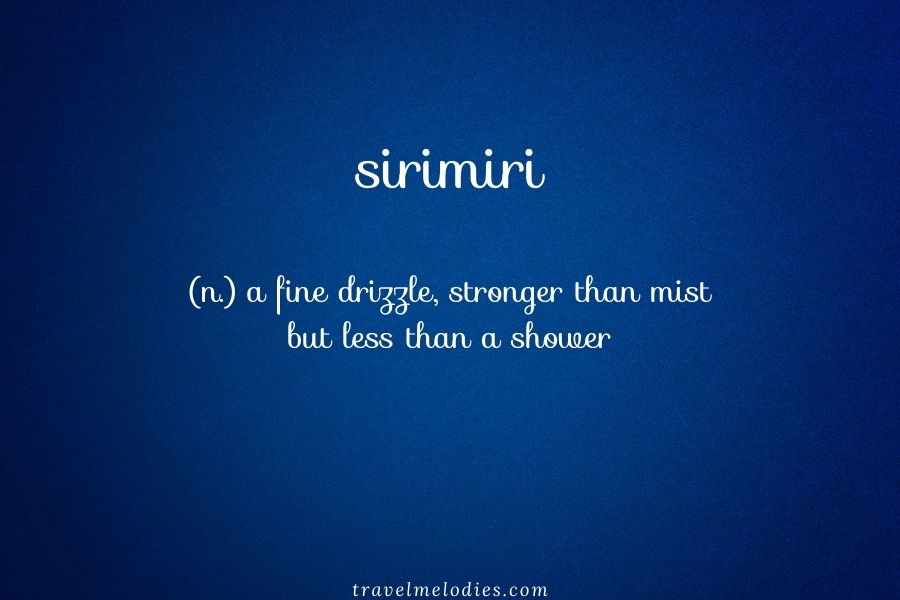
#9 Rimjhim (n.)
Pronunciation: rim-jhim
Origin: Sanskrit
Definition: The pitter-patter of a light drizzle
#10 Petrichor (n.)
Pronunciation: PET-ri-kuhr
Origin: Greek
Definition: The mild and pleasant smell or scent of earth associated with the first rain after a dry spell
Suggested Read: 14 Beautiful Norwegian Words We Need in English Now!
#11 Morii (n.)
Pronunciation:
Origin: The Dictionary of Obscure Sorrows
Definition: The desire to capture a fleeting moment
#12 Fernweh (n.)
Pronunciation: FEIRN-veyh
Origin: German
Definition: An ache for distant places; A strong desire to travel to far off places; Being homesick for a place you’ve never been; A longing for unseen places even stronger than wanderlust
Read More: Travel Quotes to Inspire Wanderlust
#13 Resfeber (n.)
Pronunciation: RACE-fay-ber
Origin: Swedish
Definition: The restless race of the traveler’s heart before the journey begins, when anxiety and anticipation are tangled together; A travel fever that can manifest as an illness
Related Read: Beautiful Swedish Words
#14 Nefelibata (n.)
Pronunciation: ne-fe-lE-‘ba-ta
Origin: Portuguese
Definition: Literally translates to “cloud-walker”; Colloquially “daydreamer”; One who lives in the clouds of their own imagination or dreams; One who does not obey the conventions of society, literature, or art.
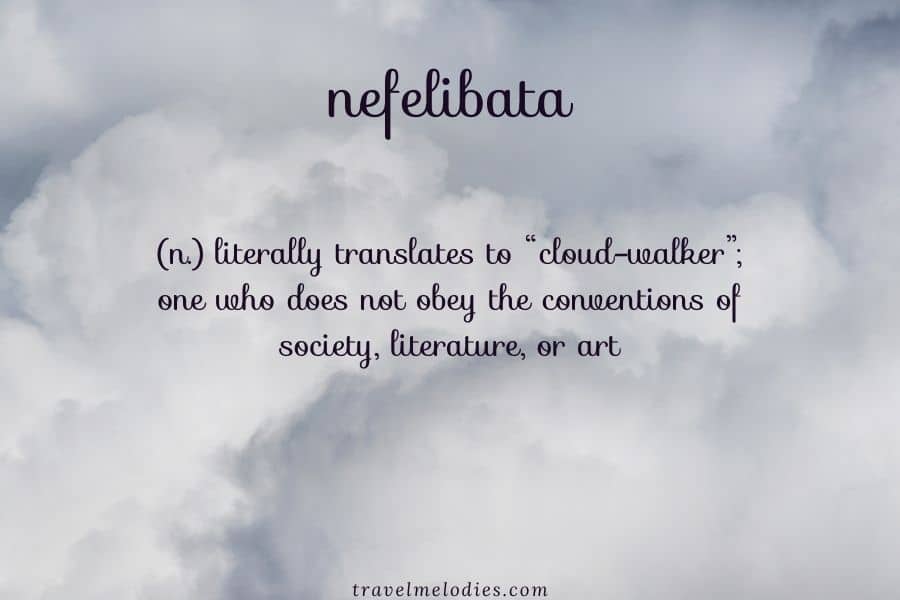
#15 Smultronställe (n.)
Pronunciation: “smUl-tron-‘stel-e
Origin: Swedish
Definition: Literally “place of wild strawberries” a special place discovered, treasured, returned to for solace and relaxation; A personal idyll free from stress or sadness.
#16 Dustsceawung (n.)
Pronunciation: ‘dUst-shA-a-wung (DOOST-shay-ah-wung)
Origin: Old English
Definition: Literally “contemplation of the dust”; Reflection on former civilizations and people, and on the knowledge that all things will turn to dust
#17 Heliophilia (n.)
Pronunciation: hE-lE-O-‘fil-E-a
Origin: English
Definition: Desire to stay in the sun; Love of sunlight
#18 Nakakapagpabagabag (adj.)
Pronunciation: na-ka-ka-PAG-pa-ba-ga-bag
Origin: Tagalog (Filipino)
Definition: Worrisome
PS: It’s hard to pronounce for the native speakers too so don’t worry if you can’t 🙂 Such a variety of pretty words in other languages.
#19 Brontide (n.)
Pronunciation: bron-tahyd
Origin: Greek
Definition: The low rumble of distant thunder
#20 Aesthete (n.)
Pronunciation: “es-THEt (ess-THEET)
Origin: Greek
Definition: Someone who cultivates an unusually high sensitivity to beauty, as in art or nature

#21 Sophrosyne (n.)
Pronunciation: sō-fros′i-nē (suh-FROS-uh-nee)
Origin: Greek
Definition: Soundness of mind, characterized by moderation, self-control, and prudence
#22 Elysian (adj.)
Pronunciation: uh-li-zee-uhn
Origin: Greek
Definition: Beautiful or creative; Divinely inspired; Peaceful and perfect
#23 Mångata (n.)
Pronunciation: moon-gah-ta
Origin: Swedish
Definition: The glimmering roadlike reflection of the moon on the water
#24 Koi no yokan (n.)
Pronunciation: koy-noh-yo-kin
Origin: Japanese
Definition: Literally translates to “premonition of love”; The extraordinary sense one has upon first meeting someone that they will one day fall in love
#25 Abditory (n.)
Origin: Latin
Definition: A place into which you can disappear; A hiding place
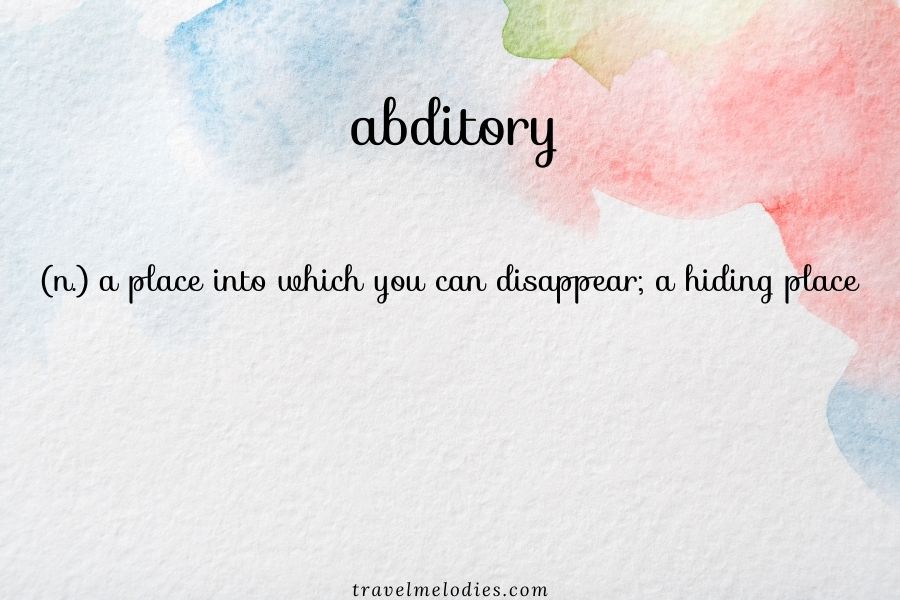
#26 Flawsome (adj.)
Pronunciation: flaw-suhm
Origin: coined by the supermodel, Tyra Banks in their show ANTM (America’s Next Top Model)
Definition: an individual who embraces their quirks and flaws and knows they are awesome regardless
#27 Datsuzoku (n.)
Pronunciation: thatza-zoku
Origin: Japanese
Definition: An escape from your everyday routine
#28 Rame (adj.)
Pronunciation: raim
Origin: BalineseDefinition: Something that’s both chaotic and joyful at the same time
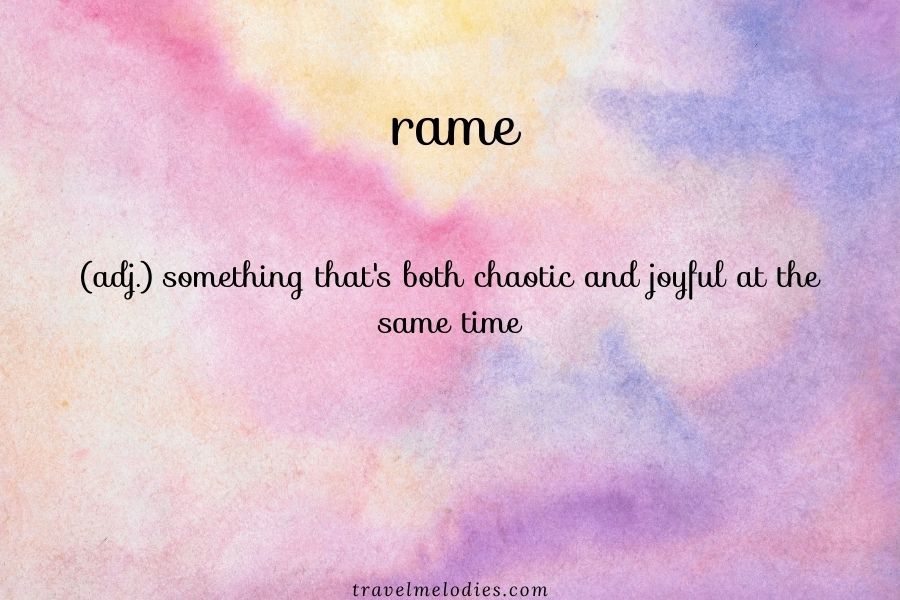
#29 Vacilando (v.)
Origin: Spanish
Definition: To wander or travel with the knowledge that the journey is more important than the destination
#30 Lehitkalev (v.)
Origin: Hebrew
Definition: Literally “to dog it”; To put up with a lower standard of uncomfortable conditions of living or travel
#31 Komorebi (n.)
Pronunciation: KOH-MOH-REHB-i
Origin: Japanese
Definition: The effect of sunlight filtering through the leaves of trees; The interplay of the aesthetics between the light and the leaves when sunlight shines through trees
#32 Metanoia (n.)
Pronunciation: meh-tah-NOY-ah
Origin: Greek
Definition: The journey of changing one’s mind, heart, self, or way of life; Spiritual conversation
#33 Peregrinate (v.)
Pronunciation: PAIR-uh-gruh-nayt
Origin: Latin
Definition: To travel or wander from place to place
#34 Perambulate (v.)
Pronunciation: puh-ram-byoo-leit
Origin: Latin
Definition: to walk or travel through or around a place or area, especially for pleasure and in a leisurely way
#35 Peripatetic (n.)
Pronunciation: peh-ruh-puh-teh-tuhk
Origin: Greek
Definition: One who walks about; A nomad; An itinerant
#36 Shinrin-yoku (n.)
Pronunciation: shindin-yoku
Origin: Japanese
Definition: To go deep into the woods for its restorative benefits; The Japanese way of forest bathing as nature therapy for peace of mind, restful sleep, and physical health
#37 Shinrabansho (n.)
Pronunciation: shi-nra-banshoo
Origin: Japanese
Definition: Literally translates to “All nature”; everything that exists in the universe
#38 Flâneur (n.)
Pronunciation: flah-neur
Origin: French
Definition: Someone who saunters or ambles around aimlessly but enjoyably observing life and his surroundings
#39 Gadabout (n.)
Pronunciation: gad-uh-bout
Origin: Middle English
Definition: A person who travels often or to many different places, especially for pleasure

#40 Hiraeth (n.)
Pronunciation: heer-eye-th
Origin: Welsh
Definition: A homesickness for a home to which you cannot return, a home which maybe never was; The nostalgia, the yearning, the grief for the lost places of your past
#41 Toska (n.)
Pronunciation: tuh-skah
Origin: Russian
Definition: The ache of the soul; Longing with nothing to long for
#42 Dépaysement (n.)
Pronunciation: depeizmɑ̃
Origin: French
Definition: Change of scene, disorientation, culture shock; Feeling that comes from being away from your own home country, in a foreign land, surrounded by strangers; The sense of being a fish out of water
#43 Dès vu (n.)
Origin: French
Definition: Literally translates to ” seen as soon as”; The awareness that this will become a memory
#44 Rasāsvāda (n.)
Pronunciation: ra-sas-vah-da
Origin: Sanskrit
Definition: Literally translates to appreciating the taste and flavor of juice; Perception of pleasure; The taste of bliss in the absence of all thoughts
#45 Cynefin (n.)
Pronunciation: ku-nev-in
Origin: Welsh
Definition: Literally translates to “habitat”; A place or the time when we instinctively belong or feel most connected; The artist Kyffin Williams described it as a relationship: the place of your birth and of your upbringing, the environment in which you live and to which you are naturally acclimatized
#46 Safarnama (n.)
Pronunciation: su-fur-nama
Origin: Persian
Definition: Travelogue; An account of the travels

We have a safarnama. Do you?
#47 Saudade (n.)
Pronunciation: ‘sau-“da-dE
Origin: Portuguese
Definition: “the love that remains” even after someone is gone; a nostalgic or melancholic longing to be near again to something or someone that is distant, or that has been loved and then lost
#48 Yūgen (n.)
Pronunciation: yoo-gehn
Origin: Japanese
Definition: A profound and mysterious sense of the beauty and awareness of the universe that triggers a deep emotional response
#49 Wabi-Sabi (n.)
Pronunciation: wah-bee-sah-bee
Origin: Japanese
Definition: A Japanese concept and art of imperfect beauty; The discovery of beauty within the imperfections of life and art; the acceptance of the cycle of life and death

#50 Ukiyo (n.)
Pronunciation: u-key-yo
Origin: Japanese
Definition: Literally translates to “the floating world”; Living in the moment, detached from the bothers of life
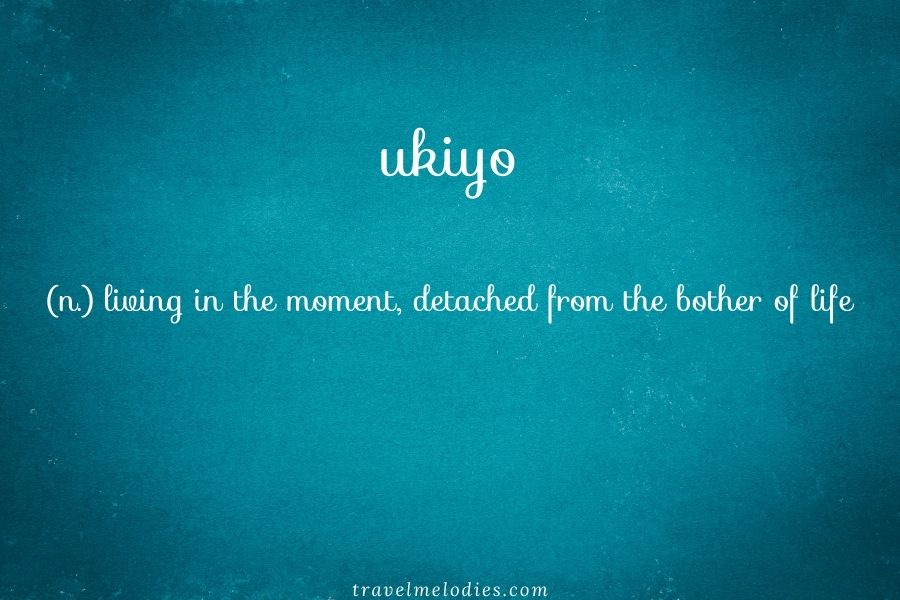
#51 Ikigai (n.)
Pronunciation: ee-kee-guy
Origin: Japanese
Definition: A Japanese concept literally translates to “a reason for being”; ‘a reason to get up in the morning’, to enjoy the meaning of life – passion, purpose, something one lives for
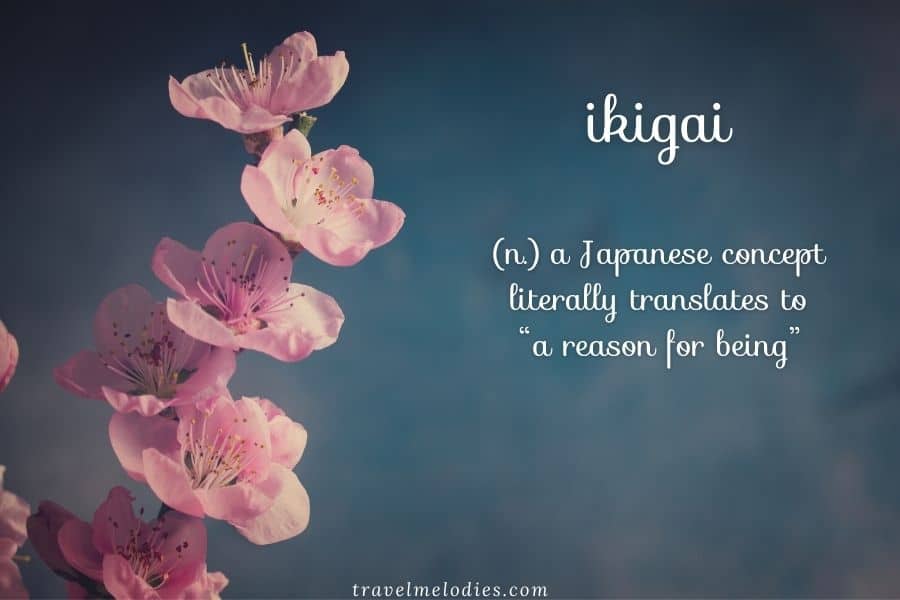
#52 Apprivoise (adj.)
Pronunciation: ap-privoise
Origin: French
Definition: Literally translates to “to tame”; To form a bond with one another; to become known to each other through small moments
We are half-way through these best words. Are you also loving these beautiful foreign words?
#53 Wu wei (n.)
Pronunciation: woo-wey
Origin: Chinese
Definition: A Chinese concept and art of conscious non-action; literally translates to “inexertion”, “inaction”, or “effortless action”, or “action without action”; To embrace the flow instead of an effort to achieve a result; A deliberate and principled decision to do nothing for a reason

#54 Còsagach (n.)
Pronunciation: coze-a-goch
Origin: Scottish Gaelic
Definition: Scottish hygge; A feeling of being snug, sheltered, and warm, inspired by fluffy rugs, cozy fires, outdoor hot tubs, and wood-burning stoves; Finding comfort in life’s simple pleasures
#55 Lagom (adv.)
Pronunciation: la-gum
Origin: Swedish
Definition: Translates to “in moderation”, “in balance”, “perfectly-simple”, “just enough”, and “suitable”; The Swedish concept of having just the right amount; not too much, not too little, just right
#56 Gigil (n.)
Pronunciation: GHEE-gheel
Origin: Filipino
Definition: The overwhelming urge to squeeze or pinch something that’s irresistibly cute and adorable
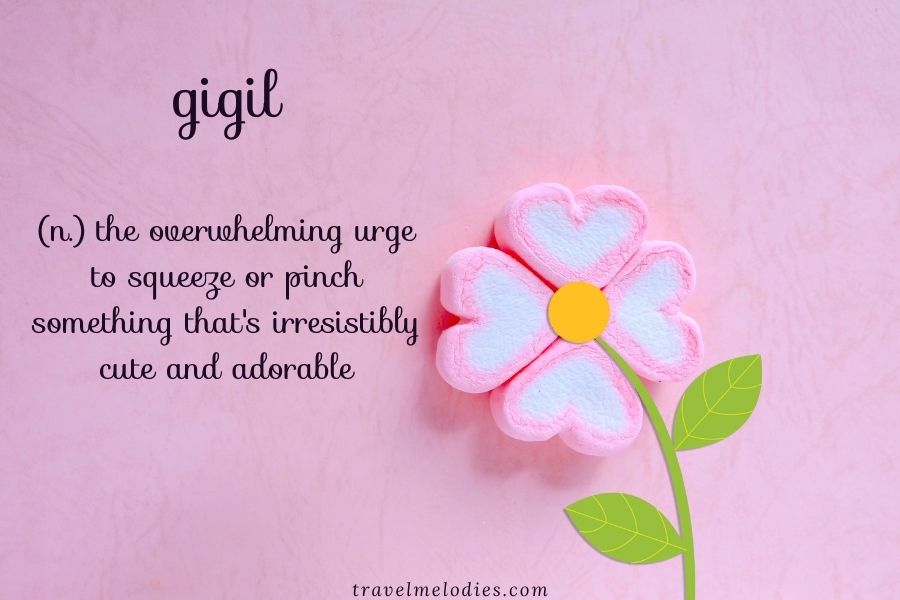
#57 Ataraxia (n.)
Pronunciation: at-uh-rak-see-uh
Origin: Greek
Definition: A state of freedom from emotional disturbance and anxiety; Tranquility or untroubled mind
#58 Musafir (n.)
Pronunciation: musa-fir
Origin: Arabic
Definition: Traveler
Here’s a list of amazing places to visit around the world for a traveler (Musafir) in you!
#59 Wayfarer (n.)
Pronunciation: wey-fair-er
Origin: English
Definition: Someone who travels, especially on foot
#60 Absquatulate (v.)
Pronunciation: ab-skwoch-uh-leyt
Origin: North American English
Definition: To leave without saying goodbye; Leave abruptly

#61 Wanderlust (n.)
Pronunciation: won-der-luhst
Origin: German
Definition: A strong, innate desire to travel and explore the world
Suggested Read: 40 Inspiring Quotes about Family Travel
#62 Utepils (n.)
Pronunciation: OOH-ta-pilz
Origin: Norwegian
Definition: Literally translates to “outdoors lager”; To sit outside enjoying a beer on a sunny day
Fancy a beer outside? What’s better than enjoying one under the Midnight Sun in the Finnish Lapland?
#63 Ballagàrraidh (n.)
Pronunciation: bal-la-ga-rye
Origin: coined by The Dictionary of Obscure Sorrows inspired by the Scottish Gaelic word – balla gàrraidh
Definition: Literally translates to the “garden wall”; The awareness that you are not at home in the wilderness
#64 Acatalepsy (n.)
Pronunciation: ey-kat-l-ep-see
Origin: Greek
Definition: The impossibility of comprehending the universe; The incomprehensibility of things; The belief that human knowledge can never have true certainty
#65 Waldeinsamkeit (n.)
Pronunciation: VALD-eye-n-zam-kite
Origin: German
Definition: Forest solitude; The feeling of being alone in the woods
#66 Cockaigne (n.)
Pronunciation: kaw-KAYN
Origin: French
Definition: Literally translates to “the land of plenty”; An imaginary or a fabled land of luxury and idleness
#67 Sonder (v.)
Pronunciation: sohn-dehrr
Origin: coined by John Koeing of The Dictionary of Obscure Sorrows inspired by German and French word – sonder
Definition: The realization that each passerby has a life as vivid and complex as your own
#68 Boketto (v.)
Pronunciation: bo-ke-tto
Origin: Japanese
Definition: The act of gazing vacantly into the distance without a thought
#69 Sprachgefühl (n.)
Pronunciation: SHPRAHKH-guh-fuel
Origin: German
Definition: The character and spirit of a language; An intuitive sense of the rule and rhythm of language
#70 Solivagant (n.)
Pronunciation: “sO-li-‘vA-gant
Origin: Latin
Definition: A solitary wanderer; Someone who wanders alone
#71 Sehnsucht (n.)
Pronunciation: zEn-‘zUkt
Origin: German
Definition: A wistful longing or indescribable yearning in the heart for we know not what
#72 Serendipity (n.)
Pronunciation: seh-ruhn-DI-puh-tee
Origin: English
Definition: To find something good without looking for it; To discover something beautiful by chance or accidentally
#73 Mudita (n.)
Pronunciation: Muw-DIY-Taa
Origin: Sanskrit
Definition: Literally translates to “pure joy”; Sympathetic, vicarious joy; Taking delight in the happiness, success, and well-being of others
#74 Tsundoku (n.)
Pronunciation: tsoon-DOH-koo
Origin: Japanese
Definition: The art of buying books and leaving them unread, often piled together with other unread books; Book hoarding
#75 Voorpret (n.)
Pronunciation: VOR – pret
Origin: Dutch
Definition: Pre-fun; The sense of enjoyment felt before party or event takes place; joy or pleasure ahead and in anticipation of the actual fun event
#76 Meraki (v.)
Pronunciation: may-rah-kee
Origin: Greek
Definition: To do something with soul, creativity, or love; to leave a piece and essence of yourself in your work
#77 Hanyauku (v.)
Pronunciation: ha-ahn-yoh-kuu
Origin: Kwangali (Namibia)
Definition: To walk on tiptoes across hot sand
#78 Jazba (n.)
Pronunciation: jaẕ-bā
Origin: Arabic
Definition: Strong desire or passion or emotion or sentiment
#79 Drapetomania (n.)
Pronunciation: drap-et-O-mAn-E-a
Origin: Greek
Definition: An overwhelming urge to run away
#80 Querencia (n.)
Pronunciation: kweeuh-ruhn-see-uh
Origin: Spanish
Definition: A place where you are your most authentic self; A place from which your strength of character is drawn, where you feel safe, where you feel at home

#81 Quaquaversal (adj.)
Pronunciation: kwey-kwuh-VUR-suh l
Origin: Latin
Definition: Moving or happening in every direction instantaneously towards a center
#82 Heimweh (n.)
Pronunciation: heim·veyh
Origin: German
Definition: Homesickness; Longing for home; Nostalgia
#83 Heimat (n.)
Pronunciation: hai-mat
Origin: German
Definition: A place that you can call home; A sense of belongingness, acceptance, safety, and connection to the homeland.
#84 Dérive (n.)
Pronunciation: dih-rih-vee
Origin: French
Definition: Literally translates to “drift”; A spontaneous and unplanned journey where the traveler leaves their life behind for a time to let the spirit of landscape and architecture attract and move them
Does this ever happen to you? I felt that drift when I visited the Vis island in Croatia.
#85 Photophile (n.)
Pronunciation: pho-to-phile
Origin: English
Definition: Derived from the biological term “photophilic” for an organism that thrives in full light, it means a person who loves photography and light
#86 Ecophobia (n.)
Pronunciation: ih-ko-foh-bee-uh
Origin: English
Definition: A fear or dislike of one’s home
#87 Numinous (adj.)
Pronunciation: ‘nU-mi-nus
Origin: Latin
Definition: Literally translates to “divinity”; Describing an experience (mostly spiritual) that makes you fearful yet fascinated, awed yet attracted – the powerful, personal feeling of being overwhelmed and inspired
#88 Schwellenangst (n.)
Pronunciation: ‘shwel-en-ahngst
Origin: German
Definition: Fear of crossing a threshold to begin a new chapter; Fear of new things
#89 Strikhedonia (n.)
Pronunciation: “strik-he-‘dOn-E-a
Origin: Greek
Definition: The pleasure of being able to say “to hell with it”
#90 Vagary (n.)
Pronunciation: vuh-gair-ee, vey-guh-ree
Origin: Latin
Definition: An unpredictable instance, a wandering journey; A whimsical, wild, unusual idea, desire, or action
#91 Livsnjutare (n.)
Pronunciation: lives-noo-tuhreh
Origin: Swedish
Definition: Literally meaning, “enjoyer of life”, This describes someone who loves life deeply and lives it to the extreme
#92 Commuovere (v.)
Pronunciation: com-muò-ve-re
Origin: Italian
Definition: To stir, to touch, to move to tears; To be moved in a heartwarming way, usually relating to a story that moved you to tears
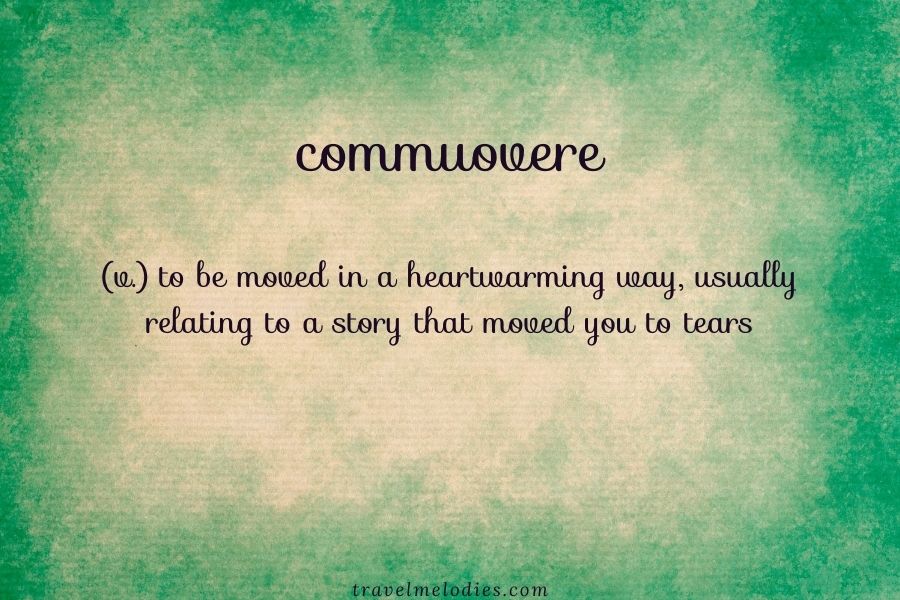
#93 Abendrot (n.)
Pronunctaion: A-bend-rot
Origin: German
Definition: Literally translates to “evening red”; The color of the sky while the sun is setting
#94 Serein (n.)
Pronunciation: suh-RAN
Origin: French
Definition: The fine, light rain that falls from a clear sky in the twilight hours after sunset or in the early hours of the night; Evening serenity
Read More: Sunset Quotes and Sunset Captions for Instagram
#95 Erlebnisse (n.)
Pronunciation: Ar-‘lEb-nis-e (ayr-LEEB-nis-eh)
Origin: German
Definition: The experiences, positive or negative, that we feel most deeply, and through which we truly live; Not mere experiences, but EXPERIENCES
#96 Astrophile (n.)
Pronunciation: as-trophile
Origin: English
Definition: A person who loves stars
Are you Astrophile? Then, you must take this epic stargazing road trip in Colorado!
#97 Psithurism (n.)
Pronunciation: sith-your-ism
Origin: English
Definition: The sound of the leaves rustling as the wind blows through the trees
#98 Trouvaille (n.)
Pronunciation: trU-‘vI
Origin: French
Definition: A chance encounter with something wonderful
#99 Hygge (n.)
Pronunciation: hue-guh
Origin: Danish
Definition: The warm feeling you get while enjoying the company of great friends and all life has to offer
Discover and experience the Danish concept of Hygge in Copenhagen! Hey, and also take a look at the beautiful Danish words!
#100 Onism (n.)
Origin: Danish
Definition: The awareness of how little of the world you’ll experience; The frustration of being stuck in just one body that inhabits only one place at a time
#101 Rückkehrunruhe (n.)
Pronuciation: rück·keh·run·ru·he, Rukeerenruhee
The feeling of returning home after an immersive trip only to find it fading rapidly from your awareness
The Dictionary of Obscure Sorrows defines – the feeling of returning home after an immersive trip only to find it fading rapidly from your awareness—to the extent you have to keep reminding yourself that it happened at all, even though it felt so vivid just days ago—which makes you wish you could smoothly cross-dissolve back into everyday life, or just hold the shutter open indefinitely and let one scene become superimposed on the next, so all your days would run together and you’d never have to call cut.
#102 Vemödalen (n.)
Pronunciation: ve·mö·da·len
Origin: Swedish
Definition: The fear that everything has already been done
The Dictionary of Obscure Sorrows defines – The frustration of photographing something amazing when thousands of identical photos already exist—the same sunset, same waterfall, same curve of a hip, same closeup of an eye—which can turn a unique subject into something hollow and pulpy and cheap, like a mass-produced piece of furniture you happen to have assembled yourself.
#103 Kopfkino (n.)
Pronunciation: kopf·ki·noOrigin: German
Definition: Literally translates to “head cinema”; It’s the act of playing out an entire scenario in your mind
#104 Quaintrelle (n.)
Pronunciation: quAn-‘trel
Origin: Middle English
Definition: A woman who emphasizes a life of passion expressed through personal style, leisurely pastimes, charm, and cultivation of life’s pleasures
#105 Pulchritudinous (adj.)
Pronunciation: pul-kruh-TOO-di-nuhs
Origin: English
Definition: Beyond beautiful; A person of breathtaking, heartbreaking beauty
#106 Yoko meshi (n.)
Pronunciation: yoh–koh mesh-ee
Origin: Japanese
Definition: Literally translates to “a meal eaten sideways”; It’s a beautiful and untranslatable word that describes the stress of speaking a foreign language.
#107 Selcouth (adj.)
Pronunciation: sel′ko̅o̅th′
Origin: Old English
Definition: Unfamiliar, rare, and strange, yet marvelous and wondrous; The way we feel the sense of wonder and amazement when we see and experience something new and unusual whilst traveling
The selcouth beauty of Plitvice Lakes National Park left us awestruck!
#108 Monachopsis (n.)
Pronunciation: mona-chop-sis, MON-a-Cop-sis
Origin: Greek
Definition: The subtle but persistent feeling of being out of place, not fitting in
#109 Eudaimonia (n.)
Pronunciation: U-de-‘mOn-E
Origin: Greek
Definition: Literally translates to “human flourishing;” A contented state of being happy, healthy, and prosperous; The way we feel while traveling
#110 Natsukashii (adj.)
Pronunciation: nats-ka-‘shE, nahtzkah-SHEE
Origin: Japanese (懐かしい )
Definition: Feeling nostalgic; Bringing back happy memories of the past
#111 Coddiwomple (v.)
Pronunciation: KAHD-ee-wahm-puhl
Origin: English slang
Definition: To travel purposefully towards an unknown or vague destination
#112 Novaturient (adj.)
Pronunciation: nuh-vuh-nyoo-tree-uhnt
Origin: Latin
Definition: Desiring or seeking powerful change in one’s life, behavior, or a certain situation

#113 Eleutheromania (n.)
Pronunciation: el-U-“ther-O-‘mAn-E-a
Origin: Greek
Definition: An intense and irresistible desire for freedom
#114 Eunoia (n.)
Pronunciation: yoo-noy-iea
Origin: Greek
Definition: Beautiful thinking; A well mind
Out of the beautiful words in English, Did you know Eunoia is the shortest English word containing all five main vowel graphemes?
#115 Sturmfrei (adj.)
Pronuciation: stirm-fra
Origin: Germany
Definition: Literally translates to “storm-free”; the freedom of being alone and being able to do what your heart desires

#116 Nemophilist (n.)
Pronunciation: ne-‘mo-fe-list
Origin: Greek
Definition: One who loves the beauty and solitude of forest; a haunter of the woods
Do you identify yourself as a Nemophilist? You must then plan a trip to one of the best national parks in the world.
#117 Halcyon (adj.)
Pronunciation: hal-see-uhn
Origin: Greek
Definition: A period of time in the past that was idyllically happy and peaceful
#118 Thalassophile (n.)
Pronunciation: thal-uh-suh-fīl
Origin: Greek
Definition: A lover of the sea or ocean
You aren’t a thalassophile if you haven’t visited Greece, Croatia, and Sri Lanka 🙂
#119 Fika (n.)Pronunciation: fee-ka
Origin: Swedish
Definition: Almost like a ritual in Swedish culture, it’s sharing a cup coffee (or tea) and cake with friends or colleagues
#120 Ogooglebar (adj.)
Pronunciation:
Origin: Swedish
Definition: Ungoogleable, someone or something that doesn’t show up in Google search results
#121 Gluggaveður (n.)
Pronunciation: glook-ah-vay-ther
Origin: Icelandic
Definition: Literally translates to “window-weather,” the type of weather that is best appreciated indoors
#122 Arbejdsglæde (n.)
Pronunciation: ah-bites-gleh-the
Origin: Danish
Definition: Literally translates to “happiness at work,” when your work is a source of joy and happiness

#123 Vorfreude (n.)
Pronunciation: vor-freude
Origin: German
Definition: The joyful, intense anticipation that comes from imagining future pleasures
#124 Brumous (adj.)
Pronunciation: bru·mous
Origin: Literary English
Definition: Of gray skies and winter days, filled with heavy clouds or fog
Craving cozy feel of a brumous day (no pun intended)? Head to one of the best winter destinations in the USA. Europe on mind? No problem. We even have a list of the best winter destinations in Europe for you.
#125 Hodophile (adj.)
Pronunciation: how-doh-phile
Origin: Greek
Definition: The one who loves to travel; A traveler with a special affinity for roads
You Might Like: The Ultimate List of Road Quotes for Road Trippers
#126 Ubuntu (n.)
Pronunciation: oo-buhn-too
Origin: Nguni, South African
Definition: Literally translates to “humanity”; It’s the belief that we all are defined by our compassion and humanity towards others
#127 Nunchi (n.)
Pronunciation: noon-chee
Origin: Korean
Definition: Literally translates to “eye-measure”; It’s a subtle art and ability to listen and gauge others’ moods and react appropriately

#128 Arcane (adj.)
Pronunciation: aa-kein
Origin: Latin
Definition: Secret, Mysterious, Understood by few
#129 Kaulayaw (n.)
Pronunciation: kauli-haw
Origin: Filipino or Tagalog
Definition: Intimate or close companion or friend
#130 Kos (n.)
Pronunciation: coosh
Origin: Norwegian
Definition: Danish hygge; coziness; all things warm and cozy; it can simply mean enjoying a cup of coffee with a freshly baked cinnamon bun or having a good time with family and friends or reading a good book or snuggling in a blanket while it’s snowing outside or anything that makes you feel purely happy.
Goes without saying, Norway is the best place to discover and experience the Norwegian Hygge.
#131 Ebullience (n.)
Pronunciation: uh·buh·lee·uhns
Origin: Latin
Definition: The quality of being bubbly, enthusiastic, and exuberant
#132 Goya (n.)
Pronunciation: go-yaa
Origin: Urdu (گویا)
Definition: As if; A momentary suspension of disbelief that occurs when fantasy is so realistic that it temporarily becomes reality, usually associated with a story very well told; a story that feels like reality
#133 Camhanaich (n.)
Pronunciation: kav’-an-ach
Origin: Scots-Gaelic
Definition: Early morning twilight; the half-light of dawn or dusk
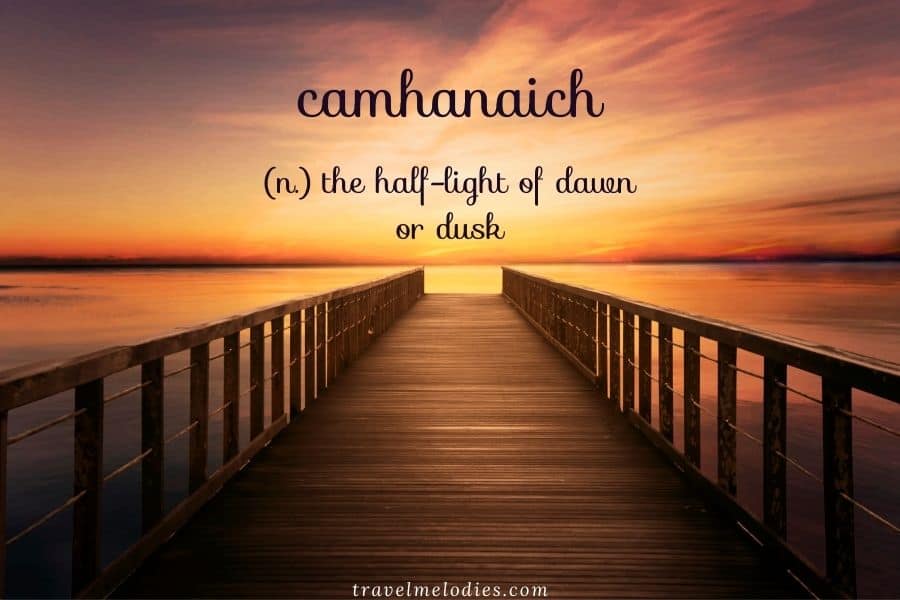
Read More: The Best Sunrise Quotes and Sunrise Captions for Instagram
#134 Kawaakari (n.)
Pronunciation: ka-wa-a-ka-rE
Origin: Japanese
Definition: The glow of a river or stream in darkness or dusk, the gleaming surface of a shadowed river
#135 Mysa (n.)
Pronunciation: MEE-sah
Origin: Swedish, Icelandic
Definition: The feeling of comfort and protection; a time dedicated to coziness
#136 Ineffable (adj.)
Pronunciation: uh-NEH-fuh-bl
Origin: Late Middle English
Definition: Incapable of being expressed in words
#137 Nefarious (adj.)
Pronunciation: nuh-FEUH-ree-uhs
Origin: Latin
Definition: Wicked, Despicable, Villainous, Evil, Sinful
#138 Somnambulist (n.)
Pronunciation: som-nam-byuh-listOrigin: French
Definition: A sleepwalker, a person who walks around while they are asleep
#139 Akrasia (n.)
Pronunciation: uh-KRAY-zhuh
Origin: Greek
Definition: Lack of self-control or the state of acting against one’s better judgment
#140 Zephyr (n.)
Pronunciation: ZEH-fuh
Origin: Old English
Definition: A breeze from the west; a gentle breeze
#141 Hanan (n.)
Pronunciation: hana-n
Origin: Arabic
Definition: Compassion and Kindness
#142 Szerelem (n.)
Pronunciation: sze -re -lem
Origin: Hungarian
Definition: Romantic love
#143 Revontulet (n.)
Pronunciation: Re-von-tu-let
Origin: Finnish
Definition: Literally translates to Fox Fires; Aurora Borealis; Northern Lights
#144 Yötön yö (n.)
Pronunciation: Yoton-yo
Origin: Finnish
Definition: Nightless night; Midnight Sun
The summer in Finland is magical. The sun doesn’t go down at all in the northern region of Finland. It’s when you can see the magical Yötön yö.
#145 Elvágyódás (n.)
Pronunciation: El-vagyo-dash
Origin: Hungarian
Definition: The desire to get away from where you currently are; Aching for what is far away
#146 Sonrisa (n.)
Pronunciation: Sohn-ree-sah
Origin: Spanish
Definition: Smile
#147 Weltschmerz (n.)
Pronuciation: velt-shmerts
Origin: German
Definition: Literally translates to translates to “world weariness” or “world pain”; It’s a melancholic feeling that comes from the realization that the material world can’t ever comfort the emotional and mental desires
#148 Sadiq (n.)
Pronunciation: Saa-duhk
Origin: Arabic
Definition: Friend; Companion; True; Faithful; Veracious; Sincere; Honest; Loyal
#149 Forelsket (adj.)
Pronunciation: for-el-skit
Origin: Danish
Definition: Being madly in love – an ineffable euphoria experienced when one’s enamored with someone
#150 Ruhaniyat (n.)
Pronunciation: Ruu-haa-niyat
Origin: Arabic
Definition: Soulfulness; Spiritualism
#151 Sarang (n.)
Pronunciation: sa-rang
Origin: Korean
Definition: Love
I’m sure with so many new words added to your vocabulary, it’d be a cinch to describe your emotions, your life, or just you. Over to you now. Which one of these words do you identify with the most? Would you like to add your favorite word to the list? Share with us in the comments section below.
Thanks for reading. I sincerely hope you enjoyed this post. If yes, would you please share it with the world.
Save the Aesthetic Words to Pinterest
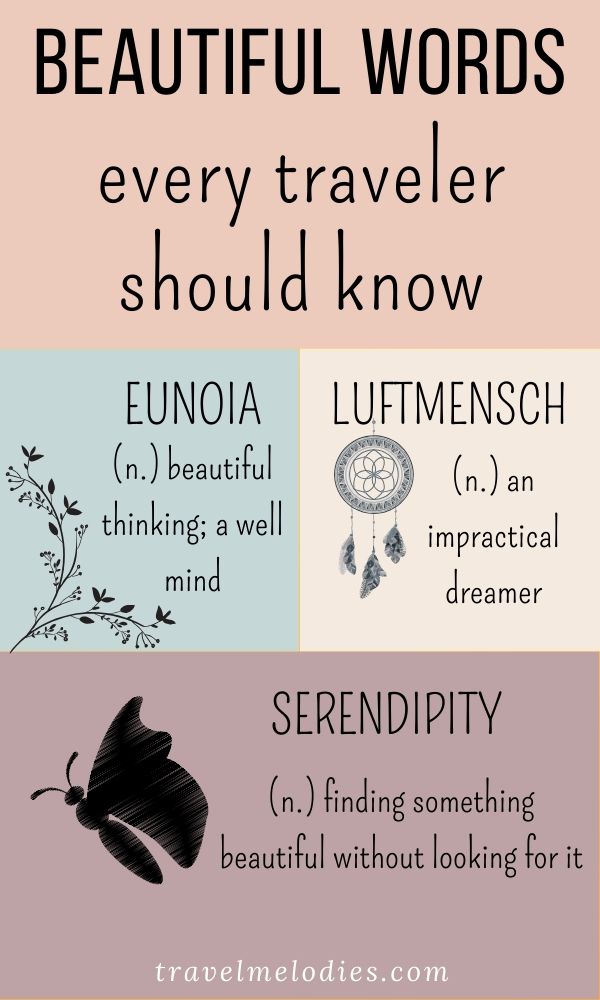
Sharing is nice 🙂 If you have liked our post please share it with your friends and family and feel free to subscribe to our mailing list or you can also follow our stories on Facebook, Instagram, Pinterest, and Twitter.

I’m passionate about language, so I set out on a quest to find the most beautiful words in the world.
It was an arduous journey, but I’m pleased with the result, and I hope that you’ll be too. The words you find below don’t all belong to the English language, far from it.
It’s essential to learn from foreign cultures that developed words and concepts not translatable to your native tongue. These arcane pieces of lexicon will allow you to see the world differently, quickly learn a new language, kick start your writing career, and change your mind in unforeseen ways.
But the goal of creating this collection was not only to find rare specimens with deep meanings. Rather, it was to find the most mellifluous tones that satisfy the concept of phonaesthetics.
Definition: Phonaesthetics is the study of beauty and pleasantness associated with the sounds of certain words or parts of words.
“Words are pale shadows of forgotten names. As names have power, words have power. Words can light fires in the minds of men. Words can wring tears from the hardest hearts.” – Patrick Rothfuss
Explore the most beautiful words in the world:
1. Toska (Russian)
Russian word roughly translated as “sadness, melancholia, lugubriousness.”
According to Vladimir Nabokov: “No single word in English renders all the shades of toska. At its deepest and most painful, it is a sensation of great spiritual anguish, often without any specific cause.”
2. Papillon (French)
A word for butterfly, borrowed from Latin pāpiliō. It’s also an informal expression for a parking ticket or a flighty genius who’s all over the place. It reminds me of one of my favorite French movies: The Diving Bell and the Butterfly (Le Scaphandre et le Papillon)
3. Komorebi (Japanese)
It can be translated as “sunlight streaming through the leaves of the trees.” It reflects the Japanese soul that longs for the beauty of nature. It’s also a great ingredient of haiku (a traditional short poem):
Sunlight filters through the dense foliage. My face welcomes it, my hand gripping the balcony railing.
4. Hanan (Arabic)
Compassion, kindness, warm-heartedness. It’s also a popular name throughout the Arab world. Munir Bashir, the great Iraqui oud player, described this word through music in a tune performed with his son Omar.
5. Kama (Sanskrit)
It’s a word for “desire, wish, longing.” It’s usually associated with carnal pleasure but actually goes deeper than that. It can refer to any kind of desire, passion, longing, or pleasure of the senses. It’s also related to aesthetics, affection, love, and enjoyment of life. In the Indian tradition, it’s one of the four goals of human life.
According to an old scripture:
Man consists of desire (kama),
As his desire is, so is his determination,
As his determination is, so is his deed,
Whatever his deed is, that he attains.
Related content: 115 Advanced words in English
6. Szerelem (Hungarian)
It’s one of the most beautiful words for “love.” It’s also the title of one of the most touching Hungarian language songs, which served as a soundtrack for The English Patient.
Love, Love, Damned anguish, Why didn’t you bloom, in the top of trees?”
7. Elvágyódás (Hungarian)
It’s an “untranslatable” word that describes a desire to get away from where you are. It signals a deep longing for something else (even though you’re not entirely sure what it is). It’s a bit similar to “wanderlust,” but not exactly there. It’s more melancholic than that.
8. Ubuntu (Nguni Bantu)
Literally “humanity.” It’s a quality that includes the essential human virtues of compassion and humanity. It can be translated as “I am because we are” or “humanity towards others.” The concept was developed in Southern Africa in the 1950s by Jordan Kush Ngubane.
According to Desmond Tutu:
“A person with ubuntu is open and available to others, affirming of others, does not feel threatened that others are able and good, for he or she has a proper self-assurance that comes from knowing that he or she belongs in a greater whole and is diminished when others are humiliated or diminished, when others are tortured or oppressed.”
9. Haneul (Korean)
It’s a word meaning “sky, heaven, ether or sphere.” It’s a popular unisex name in Korea, which may be interpreted as an urging to “spread your dreams high like the sky.” Pretty neat, eh?
10. Sonrisa (Spanish)
I love this word because it sounds like the English “sunrise” but actually means “smile.” Somehow the two concepts are intertwined.
“La sonrisa cuesta menos que la electricidad y da más luz.” (The smile costs less than electricity and gives more light.) – Proverb
Related content: 50 Sophisticated Words in English (With Examples From Movies)
11. Ancymonek (Polish)
It’s an amusing word that can be translated as “slyboots,” “scamp,” or “chap.” It describes a person who’s plotting and scheming but simultaneously feigning complete innocence. It’s used mostly in relation to children.
12. Zindabad (Persian)
This word is present in many different languages, including Odia, Punjabi, Urdu, Hindi, and Bengali. It’s used as a shout of encouragement and can be directly translated as “long live…”. It has a political connotation, but it has its place in everyday life.
13. Noor (Arabic)
It’s a charming word, also used as a unisex name in the Arab world. It means “light” or “Divine Light.” The word plays an essential role in the esoteric practices where it refers to inner illumination. It’s derived from Proto-Semitic “nūr,” which means “fire.”
14. Sadiq (Arabic)
It means “friend” or “colleague.” As everything in Arabic, it’s beautifully written (صَدِيق), especially when rendered by a skilled calligrapher.
15. Tamam (Turkish)
This is such a universal word. You’ll hear it dozens of times each day if you ever go into the heart of Istanbul. In the simplest terms, it means “okay,” but it’s used in many contexts. It’s borrowed from Arabic, in which it means “full” or “complete.” It came to Anatolia in the 12th century CE, in a book of poetry.
16. Achha (Hindi)
This is another universal word with many shades of meaning. You’ll hear it all the time if you travel to India. The literal meaning is “good,” but it can also signal surprise, as in “achha?” You can also use it to show that you understand something or as an exclamation mark (like hell yeah!). It all depends on the intonation!
17. Eonia (Greek)
It means “time immemorial” or “eternity.” You might have noticed that it’s very similar to the English word “eon” which first appeared in the 1640s from Late Latin “aeon.” In the past, the word also referred to as a “vital force.”
18. Felicidade (Portuguese)
It’s one of the best words for “happiness” I’ve ever heard. In a particular context, it can also mean “success” or “good luck.” You can even say “muitas felicidades,” which means “best wishes.” Don’t mix it up with English “felicide,” which means “killing of a cat.”
19. Carinho (Portuguese)
This word could be most closely translated as “fondness,” “affection,” or “endearment.” But in Portuguese, it’s used as a verb involving a physical action of caressing someone. You “give carinho” to others by hugging them or stroking their hair.
20. Passeggiata (Italian)
This mellifluous word means “walk” or “stroll.” You could say – “Andiamo per fare una passeggiata” (Let’s go for a walk). But it’s not just any walk. It’s more like a traditional evening stroll in the historical central piazza. It’s mostly done on Sunday evenings when everyone goes out in their best clothing.
21. Muhibbah (Malay)
It’s an important word meaning “friendship,” “living in harmony,” and it’s mostly used in the work context. It describes the feelings of camaraderie, tolerance, and understanding. Many nationalities are working together in Malaysia, so “muhibbah” is vital for a harmonious environment.
22. Bidadari (Malay)
It’s a word for “angel,” but figuratively, it can also mean “beautiful woman” or “goddess in heaven.” It comes from Sanskrit “vidyādharī,” where it means “fairy.” It’s a popular word you can find in the names of hotels, resorts, and shopping malls.
23. Saudade (Portuguese)
This is one of these non-translatable words that make your heart melt. It’s a feeling you have when you miss someone. It’s also a fundamental concept of Fado music. You can have “saudades” when you miss someone’s physical touch and presence. When you speak on the phone, you can say “que saudade!” which means that you miss them a lot.
24. Hiraeth (Welsh)
It’s a Welsh concept centered around longing for home. It can’t be directly translated, and it means more than just “missing something,” “yearning,” or “missing home.” It’s has a note of nostalgia to it, as it relates to the time of yore, that you can’t quite put your finger on. Bittersweet memories mixed with feelings of gratitude for times passed.
25. Purnama (Indonesian)
It’s a fantastic word meaning “full moon.” It originally comes from Sanskrit and has its equivalents in many other languages – Purnima (Bengali), Purnima (Hindi), Purnima (Kannada), Purnima (Marathi), Purnima (Tamil).
26. Flâner (French)
It’s a sneaky word related to strolling, hanging around, or dawdling. It’s used to describe aimless wandering through the streets of a large city (ideally Paris). A flaneur is a person who sits around in cafes for the whole day, observing people and paying no heed to time.
27. Firgun (Hebrew)
It’s a term and concept in the Israeli culture. It describes an unselfish delight or pride in the accomplishments of another person. It’s an empathetic joy you feel when something good has happened to or for another person. The antonym to this word is German “schadenfreude” – getting satisfaction from someone else’s failure.
28. Saha (Arabic)
It literally means “health,” “clear,” or “sober,” but it has a much deeper meaning in a cultural context. It’s used when you have a fit of coughing, and others say it to the effect of “bless you.” When you start a meal, you can also say “sahtein” (“two healths”) which can then be translated as “enjoy your meal.”
29. Goya (Urdu)
Here’s another untranslatable, but useful word. It’s a momentary suspension of disbelief that occurs when fantasy is so realistic that it temporarily becomes a reality. It’s usually associated with a story very well told. It’s “as if/as though” something was a reality. Goya is also the name of one of my favorite Spanish painters which only adds to the charm.
30. Allora (Italian)
If you’ve ever been to Italy, you must have heard this phrase hundreds of times as Italians are obsessed with it. Literally, it means “so, then, well.” It acts as a filler word used in conversation when you think things over. But it can also express impatience. Allora! (Come on!)
31. Auguri (Italian)
In simplest terms, it means “to wish,” but you can use it in many different situations. You can say it when wishing someone a happy birthday, congratulating them on something, during general celebrations, while offering best wishes or simply saying “all the best.” It’s deceptively similar to the beautiful English “augury” which has its roots in Latin “augurium” (“divination, the observation, and interpretation of omens”).
32. Aazaard (Flemish)
While it sounds similar to the English “hazard,” it has a different meaning. It describes a happy coincidence, for example, when you get a good deal on something, or you meet a person you haven’t seen a while.
33. Friolento (Spanish)
It’s a cute word describing someone who is overly sensitive to cold. It has a note of sarcasm in it because “frio” means “cold” and “lento” means “slow.” So theoretically it should describe someone resistant to cold, but it’s the other way around. Clever these Spaniards are.
34. Sobremesa (Spanish)
You really have to visit Spain to fully grasp the concept of “sobremesa.” It literally means “dessert” or “table cover,” but it can also refer to a prolonged after-dinner banter at a table. The Spanish love to order espressos after dinner (at 11:00 PM or even 12:00 PM) and then talk and smoke long into the night.
35. Thanatos (Greek)
It’s one of these mysterious words that slip of the tongue producing enchantment and awe. Thanatos means “death,” but it also describes a mythical figure which brings death about (like Grim Reaper). Christopher Hitchens once said: “In the war against Thanatos, if we must term it a war, the immediate loss of Eros is a huge initial sacrifice.”
36. Merak (Serbian)
It’s a fascinating word referring to a feeling of bliss and the sense of oneness with the universe that comes from the simplest of pleasures. It’s a Zen-like quality you get when you’re fully content with where you are and what you do – when the soul is settled.
37. Libellule (French)
It means “dragonfly.” If you want to turn it into true acoustic eargasm, you can say “libellule émeraude” (“emerald dragonfly”).
38. Tsundoku (Japanese)
That’s a bookworm’s favorite which describes the act of buying lots of books and never getting round to reading them. It’s a universal human activity, but it’s nice of the Japanese to come up with a word that that precisely describes it. It literally means “reading pile” and dates back to the Meiji era (1868–1912).
39. Boketto (Japanese)
It’s another poetic Japanese word that is hard to translate. It describes the idea of starting at the sky without a thought. When you stare vacantly into the sky, giving no thought to time, life, history, or anything else for that matter – you’re experiencing boketto.
40. Szept (Polish)
I like how this word meaning “whisper” has that “shhh” sound in it as if you’re already whispering.
41. Crimson (English)
Describing a deep and vivid red, this word lights up your imagination. It reminds me of Edgar Allan Poe’s “The Masque of the Red Death” and Arthur Conan Doyle’s “A Study in Scarlet.” The word comes from the Old Italian “carmesi,” but it has roots in Arabic and got into Europe because of silk clothes export.
42. Kalsarikännit (Finnish)
Another magnificent word which we should import into English! It’s related to that moment when you’re going to get drunk home alone in your underwear – with no intention of going out. In Finland, it has been elevated to an official activity. Beer anyone?
43. Habseligkeiten (German)
Goethe Institute held a competition for Germany’s most beautiful word. Based on 22,000 entries, habseligkeiten was a clear winner. It means “belongings.” It’s not related to ownership or wealth, but rather to simple possessions, and it does it in a friendly way.
44. Limerence (English)
The state of being infatuated or obsessed with another person typically experienced involuntarily and characterized by a strong desire for reciprocation of one’s feelings but not primarily for a sexual relationship. Dorothy Tennov coined this word for her book “Love and Limerence: The Experience of Being in Love.”
45. Schwellenangst (German)
It has “angst” in it so it must be something interesting, right? It describes a fear of, or aversion to, crossing a threshold or entering a place to begin a new chapter. I guess we all feel it from time to time.
46. Resfeber (Swedish)
It’s a word that must have come from the world of the Vikings. It refers to tangled feelings between fear and excitement before a journey begins. It literally means “travel fever.”
47. Querencia (Spanish)
It’s a word signaling a metaphysical concept. It comes from the verb “querer” which means “to desire.” “Querencia” can be translated as “fondness,” “homing instinct,” or “homeland.” Hemingway wrote in the Death in the Afternoon: “A querencia is a place the bull naturally wants to go to in the ring, a preferred locality… It is a place which develops in the course of the fight where the bull makes his home.”
48. Nefelibata (Portuguese)
It’s a word derived from Greek, meaning “one who walks the clouds” or “daydreamer.” You use it for a person who trudges individually, not caring about what others think (like a nonconformist). In the literature, it also describes a writer who does not follow the usual conventions.
49. Nostalgia (English)
A list of beautiful words couldn’t be complete without “nostalgia.” It’s a wistful desire to return in thought or fact to a former time in one’s life, to one’s home or homeland, or one’s family and friends. It’s a sentimental yearning for the happiness of a former place or time. “I’d trade all my tomorrows for one single yesterday,” said Kris Kristofferson.
50. Sonorous (English)
It comes from Latin “sonorus” (“resounding”), from “sonare” (“to sound, make a noise”). The pronunciation of a word fits the meaning perfectly as it describes someone or something capable of emitting a deep, resonant sound.
51. Ethereal (English)
How I love this word! It’s so lofty and fleeting and elven-like. It means “extremely delicate and light in a way that seems not to be of this world.” In the past, it used to refer to places “of the highest regions of the atmosphere.”
52. Atash (Farsi)
It’s a Persian word for “fire” which has a nice ring to it. It’s widely used in Persian poetry which often uses the concept of “the moth and the flame,” especially by poets like Farid ud-Din Attar. Being devoured by the flame refers to a metaphysical idea of getting closer to the divine.
53. Daryâ (Farsi)
Another outstanding Persian word meaning “river,” “ocean,” or “sea.” It’s also used when referring to any kind of vast expanse.
54. Firdaus (Arabic)
It means “paradise,” but it’s derived from an earlier word meaning “garden” or “enclosure.” Water is scarce in the Arab world, and hence, a paradise is often described as a lush garden abound in flowing water.
55. Niwemang (Kurdish)
It’s a beautiful word meaning “half-moon.” It’s also the title of one of my favorite Iranian movies.
56. Aisling (Irish)
It literally means “dream” or “vision.” It’s the name of a poetic genre where a poet is bestowed with a vision of a young and beautiful heavenly woman who prophesies changes of fortune for the Irish people. Aisling is also used as a feminine given name, now having many anglicized forms and variants like Ashling, Aislin, Aislinn and Aislene.
57. Spleodar (Irish)
It means “energy,” “exuberance,” “gameness,” “vivaciousness,” or “boisterousness.”
58. Suaimhneas (Irish)
It’s a word for “peace” and “tranquility.” It can also relate to calmness, composure, contentment, quietness, or repose.
59. Dobrodosli (Slovenian)
It’s a marvelous Slavic word for “welcome.” It’s comprised of two distinct words, “dobro” and “dosli,” and it can be literally translated as “you came in a good way.” It’s something you would want to hear after finishing a long trip.
60. Mir (Slovenian)
Short and punchy, “mir” is a Slovenian word for “peace,” “quiet,” and “tranquility.” It’s also the name of a Russian space station.
61. Huzun (Turkish)
It’s dark, but a beautiful word for “sadness,” “melancholy,” or “gloominess.” I was first introduced to it by the Turkish author, Orhan Pamuk. The word has Arab origins, but in modern Turkish, it denotes a sense of failure in life, lack of initiative, and a retreat into oneself.
62. Safderun (Turkish)
This word sounds like it was taken straight from “Arabian Nights.” It’s used to describe a person whose heart is so pure that they are often easily fooled. It could be translated as “gull.”
63. Namaste (Hindi)
It’s a word used as a customary greeting across India. It comes from Sanskrit where it meant “a reverential salutation.” But it can be translated as “I bow to the divine in you.” If you want to do it properly, you bow slightly and smile when saying it!
64. Jijivisha (Hindi)
It’s an untranslatable word that signifies an intense desire to live and continue living to the fullest in the highest sense of being.
65. Sundar (Hindi)
It’s an adjective meaning “beautiful.” In a broader sense, it also means attractive, beautiful, good, handsome, or nice.
66. Kvietok (Slovak)
This word has a nice ring to it, especially to a Slavic ear like mine. It means “flower.” It’s especially significant for Slovaks who love to give flower bouquets and grow magnificent gardens.
67. Geluksalig (Afrikaans)
It’s a word used to describe the highest form of happiness. It’s often used when referring to the hereafter joys of paradise.
68. Skitterend (Afrikaans)
It can be most accurately translated as “glistering” or “splendid.” It’s a mixture of Dutch words that literally mean “exuding light that seems alive.” How cool is that?
69. Dor (Romanian)
It’s a powerful, almost magical word that’s a bit hard to translate. In simple terms, it means “longing” or “to miss something.” It comes from the Latin word dolus, which means “pain” and is related to the Romanian word durere (also “pain”).
70. Balaur (Romanian)
It’s a straight-from-fantasy-like word for a “dragon” or “monster.” It has an uncertain origin, but it’s deeply connected to Romanian folklore. A Balaur is a large creature with fins, feet, and up to twelve serpent heads. It represents evil, and its name (rightfully so) was used in popular RPG games and fantasy novels.
71. Badkruka (Swedish)
It’s a funny but charming word for a person who’s afraid to go into the water. Swedes are surrounded by water (which is freezing cold). It’s only natural that some inhabitants of this Nordic land aren’t too eager to take a dip.
72. Dépaysement (French)
It can be literally translated as “to be uncountried.” It signifies disorientation or cultural shock we sometimes feel in a strange and foreign land.
73. Zapoi (Russian)
This word is used to describe several days of continuous drunkenness during which one withdraws from society. People often “dive into a zapoi” during the New Year’s season when Russians are thought to collectively drink 1.5bn liters of alcohol.
74. Gattara (Italian)
It’s an endearing word for “cat lady.” Gattaras are usually old devout cat lovers who feed alley cats or surround themselves with cats at home. Imagine an Italian version of the crazy cat lady from The Simpsons.
75. Trepverter (Yiddish)
It literally translates as “stepwords,” but actually means a witty comeback you think of only after it’s already too late. It’s this brilliant, but the late conclusion you think of when you can’t say it to anyone because you blew your chance.
76. Litost (Czech)
According to the famous writer Milan Kundera, this word is quite difficult to render in English. It signifies a state of being a singular entity in the face of overwhelming hopelessness and painfully evident helplessness. You could say it means “self-pity,” “sorrow,” or “regret,” but not quite.
77. Voorpret (Dutch)
Literally translated as “pre-fun” this word is terrific because it’s all about the excitement you feel right before an event you’ve been waiting for.
78. Tampo (Filipino)
It’s a “silent treatment” you get from a girl if you irritate her or renege on the promise you gave her. If you hurt somebody’s feelings, your significant other will withdraw his or her affection and force you to endure the pain of psychological separation. The closest English translation for “tampo” is “sulking.”
79. Tartle (Scottish)
It refers to that funny moment when you hesitate in recognizing a person or thing. You know them from somewhere, but at that moment you can’t recall from where. In this situation, you can say, “pardon my tartle!”
80. Kaapshljmurslis (Lithuanian)
This convoluted and wizardly word is used to describe the atmosphere in public transport during the rush hour. You’re cramped in a tube or a bus and can’t wait to get out of there. At this moment you’re experiencing the notorious kaapshljmurslis.
Did you get inspired by the exotic words above? The variety of lexis and meaning throughout different cultures is fascinating!
This list is by no means complete, so please oh, language lover share some of your favorite examples!
Rafal Reyzer
Hey there, welcome to my blog! I’m a full-time blogger, educator, digital marketer, freelance writer, editor and content manager with over 10 years of experience. I started RafalReyzer.com to provide you with great tools and strategies you can use to achieve freedom from 9 to 5 through online creativity. My site is a one-stop-shop for freelance writers, bloggers, publishers, content enthusiasts who want to be independent, earn more money and create beautiful things. Feel free to check my archive containing over 600 articles and my YouTube channel for writers and content creators. Ah yes, and stay awesome!
While languages like Portuguese and French are known for their romantic words and aesthetically pleasing phrases, there’s a lot to say about the beauty of the English language. After all, English has brought us stunning, showstopper words such as incandescent and euphoria, mellifluous and demure. So if you’re feeling inclined to increase your vocabulary while making it as easy on the ears as possible, then you’re in for a serendipitous treat. For 60 of the most beautiful words in the English language, which are guaranteed to make you absolutely ebullient, read on. And for more words to share with your friends, check out The 30 Funniest Words in the English Language—And How to Use Them.
1. Labyrinth
Do you ever find yourself working on a tedious task with many twists and turns? If you’re stuck doing something that’s extremely complex, you can call it a labyrinth. Additionally, any maze or place with «intricate passageways» can be described by this word.
2. Ineffable
Sometimes, almost every word fails. When that happens, you can turn to the word «ineffable,» which means «unspeakable» or «indescribable.» For example, if your feelings about someone are almost impossible to accurately pin down, you can say they’re ineffable.
3. Incendiary
Meaning extremely hot or inflammatory, anything that causes a fire is incendiary. However, when used in contexts that aren’t related to fire, this word can also describe someone who likes to start quarrels.
4. Ephemeral
Things that don’t last forever are ephemeral. From conversations to arguments, some things just tend to be short-lived, which isn’t necessarily a bad thing.
5. Cynosure
Back in the 17th century, the word cynosure was used to describe the northern constellation, Ursa Minor. And while this is still the case now, Merriam-Webster additionally notes that anyone who is the «center of attention» or «serves to guide» is cynosure.
6. Propinquity
Similar to the term proximity, the word «propinquity» is another way to talk about someone who lives near you. Aside from your next-door neighbors and roommates, it can also refer to «nearness of relation,» in terms of kinship.
7. Infatuation
Do you have a really strong desire to be near or know more about someone, you may have an infatuation. You can also use the term to describe your non-human obsession of the moment, whether it’s a TV show or your new puppy.
8. Incandescent
While the word «incandescent» is one way to talk about the electric lamps in your living room, it can also be used in reference to the brightness or someone’s intellect or personality.
9. Eudaemonia
Originated from the Greek word «eudaimon,» the word «eudaemonia» means the state of being lucky or happy. If you’re in a state of general well-being or feeling great joy, this is one way to express it.
10. Raconteur
Are you good at telling a story? Then you can start telling your friends that you’re a raconteur. Even if you’re not the best storyteller, it’s still a fun word to say.
11. Petrichor
The Greek words for «stone» and the «ethereal blood of the gods» combine to give us a perfectly beautiful term for the way the earth smells after it rains. Scientists have spent decades trying to determine exactly why that smell is so pleasing; in fact, two are credited for coining «petrichor» in a 1964 Nature article.
12. Sumptuous
Meaning «extremely costly, rich, luxurious, or magnificent,» the word «sumptuous» can be used to describe anything from a five-star vacation to your favorite fluffy blanket.
13. Angst
If you’ve woken up with a prevailing sense of anxiety about how the day will go, you could say you’re experiencing some angst. It’s not a pleasant feeling, but the word for it, which dates back to the eighth century, does have a certain soothing sound.
14. Aesthete
An aesthete, according to Merriam-Webster, is «one having or affecting sensitivity to the beautiful especially in art.» You might be one if you’re frequently moved by sculptures and paintings…or if you pretend to be for the sake of other people. Either way, the word is a joy to say.
15. Nadir
An astronomical term that’s been co-opted for colloquial usage, nadir means the lowest point, as in the «nadir of her popularity.» Its opposite term, zenith, has a similar appeal.
16. Miraculous
That which seemed impossible or at least incredibly unlikely without the influence of some supernatural force can be described as «miraculous.» Maybe that’s the birth of a child or being able to carry on a morning conversation before a cup of coffee.
17. Lassitude
Suffering from a lack of energy? Describe your tiredness—whether it’s in your body, your mind, or both—with this term, and at least it will sound prettier.
18. Gossamer
One of several definitions of this word, per Dictionary.com, is «a fine, filmy cobweb seen on grass or bushes or floating in the air in calm weather, especially in autumn.» It’s thought to have come from the Middle English term gosesummer, «possibly first used as name for late, mild autumn, a time when goose was a favorite dish.» But it can also be used to refer to anything thin and airy, from a summer shawl to the wings of a butterfly.
19. Bungalow
Bungalow is a cozy word for a specific type of house: usually one that’s either a single story or two stories with a sloping roof. Though there may be additional criteria depending on where in the world you’re using the term.
20. Scintilla
Not to be confused with those furry crepuscular rodents, scintilla means a spark or a trace of something. Perhaps you feel a scintilla of guilt after eating the last cookie, or experience a scintilla of attraction to someone you just met.
21. Aurora
Originally the name of the Roman goddess of sunrise, the word aurora is now used to describe the dawn, as well as the stunning luminous phenomenon that takes place in the upper atmosphere of a planet’s magnetic polar regions. For example, you may have a trip to see the Aurora Borealis as an item on your bucket list.
22. Inure
Not all beautiful words have beautiful meanings. The word inure means to accept or grow accustomed to something undesirable. For example, your family’s constant criticism could inure you to toxic behavior from loved ones.
23. Mellifluous
This lyrical word refers to something that is sweet and enjoyable, especially when it comes to sound. You might find the early spring sounds of chirping birds to be quite mellifluous.
24. Euphoria
Derived from the Greek word for healthy, the word euphoria is now used to describe an intense feeling of happiness or elation. A sense of euphoria may be the result of a fortunate turn of events or an indescribable personal high.
25. Serendipity
You’ve probably experienced this phenomenon more than you realize—remember that time you went on a coffee run and stumbled upon the best chocolate cake your city has to offer? Or when you were cleaning your home and found those earrings you thought were gone years ago? Those happy coincidences are all cases of serendipity.
26. Cherish
The word cherish means to hold dear or cultivate with care and affection. Whether that’s your family, your home, or your most prized possession (or all three!), everyone has someone or something that they cherish.
27. Demure
One of our favorite beautiful words, demure is used to describe any modest and reserved behavior. Etymologists believe it may have been derived from the Anglo-French verb demorer or demourer, which means «to linger.»
28. Elixir
If you’re well-versed in the world of Harry Potter, you probably associate this word with the elixir of life derived from the Sorcerer’s Stone. In the 17th century, alchemists believed it was possible to create an elixir that would turn base metals to stone and allow people to live forever. Today, the word is used to identify a substance that’s capable of changing base metals into gold. You might also use it to describe that cocktail you just whipped up at your home bar.
29. Eternity
Forever; always; a limitless time. These are just some ways to describe the endless and sometimes frightening idea of eternity.
30. Felicity
This one’s just another word for a state of happiness. For example, you might find yourself in a state of felicity the next time you’re surrounded by people you love.
31. Languor
Another beautiful word with a not-so-beautiful definition, languor refers to lethargy or weakness in body and mind. You might experience this phenomenon when you’ve been working too many hours and are starting to hit burnout. All that means is it’s time to use that PTO!
32. Love
There’s way more than one definition for this feeling, action, phenomenon (etc, etc). But we can all agree that the word love is as beautiful as everything it describes.
33. Solitude
If you’re an extrovert, then solitude may not be ideal. But if you’re an introvert, you’ll probably enjoy and seek out solitude, or the act of being alone and away from society.
34. Epiphany
While there are several meanings of this word, most people associate an epiphany with a life-changing realization. You’ll find examples of these in your favorite books and movies, such as the classic scene in Clueless when Cher realizes she’s «majorly, totally, butt-crazy in love» with her stepbrother Josh.
35. Quintessential
Have you ever met someone who embodies all of the characteristics of the city they’re from or the career path they’ve chosen? Then you might have come across someone who is perfectly typical, otherwise known as quintessential. Snacking on strawberries and cream while sipping a Pimm’s Cup at Wimbledon? That’s so quintessentially British!
36. Plethora
This word has two definitions—one beautiful and one not so beautiful. While plethora is most commonly associated with having an abundance of something (close your eyes and picture a plethora of disposable income!), it’s also a medical word that’s used to describe increased blood in a specific area.
37. Nemesis
As beautifully as this word rolls off of the tongue, it is associated with a rival or arch-enemy and can be used to describe inflicting an act of vengeance. That friend-of-a-friend who grinds your gears every time he comes to Friday night drinks? He might be your nemesis.
38. Lithe
One syllable and full of grace, the word lithe is used to characterize flexibility and a slim figure. For example, you may have noticed the lithe ballerinas when you attended a performance of The Nutcracker at Christmastime.
39. Tranquility
Hopefully, you’ll achieve a state of tranquility on your next beach vacation. This is just another word for being free from agitation of mind or spirit.
40. Elegance
Another word that sounds exactly the way it’s defined, elegance is a quality of style and grace.
41. Renaissance
Whether you’re referring to your own personal revival in life or the transitional period between the 14th and 17th centuries, the word renaissance will roll off the tongue and fulfill all of your aesthetically pleasing linguistic needs.
RELATED:
For more up-to-date information, sign up for our
daily newsletter.
42. Eloquence
A quality found in the most skillful politicians, this word refers to persuasive expressiveness. Look out for eloquence in the 2020 presidential debates—which candidate’s eloquence will win your vote?
43. Sequoia
These larger than life trees can be found throughout California, particularly in their namesake national park in the southern Sierra Nevada Mountains. Having a hard time differentiating between a sequoia and a redwood (or the Sequoia National Park and the Redwood National and State Parks)? Here’s an easy way to differentiate: if you’re on the coast, then you’re probably looking up at a redwood; if you’re inland, then you’ve definitely found yourself in the presence of a sequoia.
44. Peace
Ever versatile, the word peace can refer to a state of mind, freedom from civil disturbances, or a time without war.
45. Lullaby
There isn’t a better word to describe a soothing melody to get your child to sleep. But this word isn’t reserved for babies—it can also be used as a verb meaning to quiet with or as with a lullaby.
46. Paradox
The beginning of the end. Youth is wasted on the young. These are both examples of paradox, or a statement that seemingly contradicts itself.
47. Pristine
This beautiful word seems to sparkle—and that’s fitting, since pristine means «fresh and clean or as if new.»
48. Effervescent
Here’s a clever new way to describe the bubbly can-do person around your office. Instead of merely calling them fun to be around, you could take things up a notch and say they have an effervescent personality. That simply means they have an appealingly lively quality.
49. Opulence
Do you dream of owning a mansion in Beverly Hills with a Maserati in the driveway and regular shopping trips on Rodeo Drive? Then you might be pining for a life of opulence. Keep on grinding!
50. Ethereal
This light and airy word might remind you of celestial bodies. Ethereal can refer to the upper regions of space as well as anything that is heavenly and unworldly seeming.
51. Sanguine
A complicated and beautiful word, sanguine comes with several meanings. It’s typically used as a synonym for optimism, but it can also describe a blood-red hue or something relating to blood.
52. Panacea
Panacea means all-healing in Greek and, fittingly, Panacea was the Greek goddess of healing. Today, the word is used to refer to something that could fix everything. Imagine a remedy for all of the problems you face on a daily basis—that would be a panacea.
53. Bodacious
While this word is often used to describe a body’s curves, bodacious can also be used to describe something that is remarkable or admirable. For example, a person might have a bodacious energy or a home might have bodacious decor.
54. Axiom
An axiom is a statement that is widely accepted as true. For example, from the Declaration of Independence—»we hold these truths to be self-evident, that all men are created equal, that they are endowed by their Creator with certain unalienable Rights, that among these are Life, Liberty, and the Pursuit of Happiness.» These «truths» could also be described as axioms.
55. Silhouette
Depending on the situation, seeing a silhouette—or the outline of a figure—may be beautiful or spooky. For example, seeing the silhouette of a young couple on a park bench is lovely, but if you see a shadowy silhouette in a house you thought was empty, then you might want to run away.
56. Surreptitious
This word means to act clandestinely or to do or acquire something by stealth. For example, that person at your job who always seems to be working on a secret project might be considered surreptitious.
57. Ingenue
You’ll find examples of this word in classic literature, film, and television. Naive and innocent female characters such as Sandy at the start of Grease and Ophelia from Hamlet are examples of ingenues.
58. Dulcet
This dainty word is another one that seems to describe exactly what it sounds like—which is anything that is generally pleasing. For example, you may have recently listened to particularly dulcet music or indulged in a dulcet chocolate cake.
59. Tryst
This crisp word is usually used to describe a somewhat discreet meeting between two lovers. While technically defined as any sort of meeting or appointment (not necessarily with romantic motivations), you probably don’t want to refer to the next meeting at your office as a «tryst».
60. Ebullience
A beautiful word that’s probably best used to describe a litter of golden retriever puppies, ebullience is the quality of excitement and enthusiasm.
And for how English is used in different regions of the U.S., here are 60 Words People Pronounce Differently Across America.
His delight in battle arises solely from the loss of a beloved wife, and sadly calculated was the end of the beautiful Mrs Macduff to make the most serious impression on a husband’s mind, all the more so, perhaps, in that so fully did she merit that epithet _beautiful_ which was always attached to her name. ❋ A. M. W. [Compiler] Stirling (N/A)
He owes (owns, possesses,) a beautiful harp — _beautiful_! ❋ Various (N/A)
— _More beautiful, most beautiful_, etc. can hardly be called degree forms of the adjective. ❋ Brainerd Kellogg (N/A)
Where the adjectives and adverbs have two or more syllables, most of them are compared by the use of the adverbs _more_ and _most_, or, if the comparison be a descending one, by the use of _less_ and _least_; as, _beautiful, more beautiful, most beautiful_, and ❋ Thomas Wood (N/A)
Indoors I can’t breathe — but out of doors and at night this Paris of ours, — ah! she is still beautiful — _beautiful_! ❋ Humphry Ward (1885)
She was very young, I remember now with sorrow, and very beautiful; though _beautiful_ is not so much the word to describe her as _charming_ — magnetic, graceful, intelligent. ❋ Frances Fuller Victor (1864)
It may be said of many a man, as d’Annunzio says of the hero of his _Trionfo della Morte_ in relation to the woman he loved, that «he felt himself bound to her by the real qualities of her body, and not only by those which were most beautiful, but specially by _those which were least beautiful_» (the novelist italicizes these words), so that his attention was fixed upon her defects, and emphasized them, thus arousing within himself an impetuous state of desire. ❋ Havelock Ellis (1899)
How beautiful, how _beautiful_ it is to be alive! » ❋ Fanny Barry (N/A)
Oh, you are going to get such a beautiful, _beautiful_ bird! » ❋ Unknown (1888)
Yes, Miss Montague, if we can only work it up it will be a beautiful case — a _beautiful_ case, «he concluded, with singular enthusiasm. ❋ Mrs. Georgie Sheldon (1884)
«You live in such a beautiful, _beautiful_ place, with such an elegant husband, too! ❋ Caroline Lee Hentz (1828)
Leslie does not mean this as an insult, though perhaps she uses the word beautiful less easily than I. ❋ Leslie F. Miller (2009)
Although no attempt at decoration is ever made, either of the inside or the outside of the houses, it is not uncommon to hear the term beautiful applied to them. ❋ Cosmos Mindeleff (N/A)
Also this song is similar to Beautiful Disaster (hence the title beautiful mess) but now were watching it in Robs perspective. ❋ Unknown (2010)
In the surface the term beautiful mess can stand for Kristen not being the typical Hollywood starlet that weve been abused with. ❋ Unknown (2010)
The term beautiful gets thrown around a lot these days, when in fact there really aren’t that many celeb ladies worthy of the title — to quote that old saying ‘They don’t make em like they used to’ ❋ Unknown (2009)
The term beautiful is subjective and can not be quantified. ❋ Ssmith12 (2009)
[that girl] is beautiful! ❋ Kenz40 (2007)
I find myself [stunned] each morning by the [sunrise], similar to the feeling when I look over and see my love sleeping. Both are so full of beauty, [so very] beautiful. ❋ Noodletron (2009)
Person 1: She’s beautiful. [everything] about her is amazing.
[Person 2]: Yeah, she’s so [unique]. ❋ BlueberryXcookie (2010)
[My girlfriend], [Riley], is [the true] definition of the word beautiful. ❋ Woolley_mammoth (2010)
[Virginia] is a [beautiful woman]! ❋ Your Friend Forever (2005)
An [appropriate] response:
«[You’re beautiful].»
«[I love you too].» ❋ You Are Beautiful (2007)
Damn! [I am beautiful] [af] [today] ❋ Some Beautiful Girl (2017)
[Cletus]: «That [gurl] is soooo beautiful!»
Joe [Schmoe]: «No she’s not, that other girl is.» ❋ Thekidaren’talright (2011)
[She/He] [got his] stuff together, and confident not [cocky], he beautiful! ❋ YEYE (2005)
[You are beautiful]
If you [look up] beautiful in [the dictionary], it will come up with You. ❋ Kindheart (2010)


